Mitchell Hadley's Blog: It's About TV!, page 42
November 18, 2023
This week in TV Guide: November 18, 1967
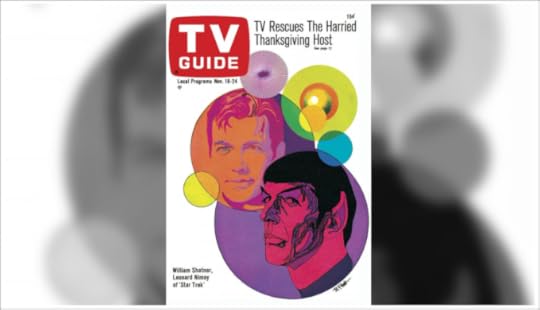
 Thanks to a typographical error, you almost wound up with another issue this week, which would have been disastrous. Fortunately, however, disaster was averted, which means we're on to another great Thanksgiving issue! Thanksgiving in 1967 was, as it is this year, on November 23, which means this should be a great lead-in to one of the best days of the year.
Thanks to a typographical error, you almost wound up with another issue this week, which would have been disastrous. Fortunately, however, disaster was averted, which means we're on to another great Thanksgiving issue! Thanksgiving in 1967 was, as it is this year, on November 23, which means this should be a great lead-in to one of the best days of the year. Not everyone shares my opinion on Thanksgiving. For some, such a family get-together is a source of dread greater than a turkey watching the farmer sharpening his ax . If you live in such a family, you have my sympathies—you indeed have less to be thankful for than some of us. But if you're looking for a solution to such problems, perhaps you just need to read what Stanley Frank has to say, because he can show you how television makes your Thanksgiving Day better than ever.
The TV Guide writer knows what such family gatherings can be like; the motley collection of relatives, the "opinionated loudmouth determined to impress one and all with his garbled misinformation, the in-laws and the "incessant yakking and bragging of birdbrains on her side of the family who make more money than I do," and the like. The secret, Frank has discovered, is to "create a community of interest that will keep them from each others' throats." And the way that you do that is by turning on the television.
"The incontrovertible truth," he says, "is that TV is the greatest boon to family harmony since the introduction of the second bathroom, and a vigorous defense of this marvelous force for domestic tranquility is long overdue. I mean the rapport TV has brought to family gatherings, especially during the holiday season that is rapidly approaching like a thundercloud." Frank even took the precaution of renting a portable color set to augment his regular black-and-white set. By making sure there's television for everyone, "it unites them in criticism of the show they’re watching. Their hostility is diverted from the host to the performers on the screen."
Now, if that isn't a recommendation, I don't know what one is.
True, there are some dangers involved in using TV as such a buffer. "The networks competing for the home audience are loading holiday schedules with so many morning attractions that people come early and turn a dinner invitation into an all-day chomping and guzzling marathon." Last year's specials began at 10:00 a.m. with the dual parade telecasts on NBC and CBS, which, in the Frank household, meant "coffee, Danish, eggs and booze, in reverse order of preference." Then came the football, beginning at 11:00 a.m. with the Detroit Lions and their annual clash. They say the early start is meant to give fans a chance to get home in time for Thanksgiving dinner, but in reality, it's "designed to give freeloaders an early start on heartburn." On balance, however, "the emotional wear and tear saved by TV more than compensates for the extra cost." For instance, the youngsters were drawn to Treasure Island on the second set, which started at 1:30; they were so enthralled "they refused to come to the table." That was a plus.
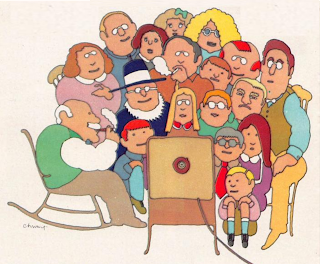 Further benefits came at 3:00 p.m, with two games on the air, a pro game on NBC and a college tilt on ABC. "It is unclear how the myth originated, but it is an enduring fallacy of American folklore that after overeating at family dinners everyone is in a torpor broken only by gentle burping." The truth is that before television, after-dinner conversation consisted of "a relentless torrent of such pompous nonsense that even the nitwits could not let it pass unchallenged. One word led to another and the situation deteriorated into a free-for-all of abusive name-calling." But with two games on simultaneously, "guests were so confused shuttling between the two sets to catch both games that they forgot to repay old favors with contempt."
Further benefits came at 3:00 p.m, with two games on the air, a pro game on NBC and a college tilt on ABC. "It is unclear how the myth originated, but it is an enduring fallacy of American folklore that after overeating at family dinners everyone is in a torpor broken only by gentle burping." The truth is that before television, after-dinner conversation consisted of "a relentless torrent of such pompous nonsense that even the nitwits could not let it pass unchallenged. One word led to another and the situation deteriorated into a free-for-all of abusive name-calling." But with two games on simultaneously, "guests were so confused shuttling between the two sets to catch both games that they forgot to repay old favors with contempt." And now, for dessert, so to speak: the men voted to continue with the Dallas-Cleveland game at 6:00 p.m. In the past, "wives, tired of yelling at their rotten kids and resentful of the fun the men were having, always turned on their husbands and demanded to go home while they, the husbands, were in condition to drive." But the second TV enabled them to tune in to Divorce Italian Style, with Marcello Mastroianni. "The ladies blissfully watched Mastroianni and the gents happily watched Danny Villanueva kick four field goals to win the game for Dallas." That was followed by the CBS Thursday Night Movie, which happened to be Jason and the Argonauts, "a gem of a horror that cleared the joint with occasional groans and retching noises from me. As I said, TV is a wonderful instrument for serenity."
So the moral of the story is that if you're dreading this year's family gathering, try television. It may seem counterintuitive to those who've grown up hearing how TV turns us all into couch potatoes, but trust Stanley Frank: "The family that watches television together stays together." Especially at Thanksgiving.
And by the way, if you're wondering what's TV has to offer on Thanksgiving Day, 1967, tune in on Monday; as I've done in the past, Monday's listings will be from Thanksgiving, and I'll have all the details on parades, football, and more! But even without it, there's a lot to watch this week, as you'll soon find out.
l l l
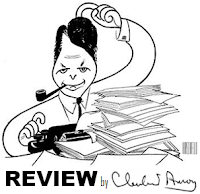 Throughout the 60s and early 70s, TV Guide's weekly reviews were written by the witty and acerbic Cleveland Amory. Whenever we get the chance, we'll look at Cleve's latest take on the shows of the era.
Throughout the 60s and early 70s, TV Guide's weekly reviews were written by the witty and acerbic Cleveland Amory. Whenever we get the chance, we'll look at Cleve's latest take on the shows of the era. A few years ago, Cleveland Amory described Raymond Burr's performance as Perry Mason as "too businessmanish." The great man is now ready for two large helpings of crow, for Burr's performance in NBC's Ironside is, in a word, "magnificent." "Playing San Francisco police detective Robert Ironside, a man confined to a wheel chair, he is, in character range, far from confined, and with the same ease with which he manipulates his chair he moves from fury to fun and from cynical curmudgeon to philosophical elder statesman."
But don't think that the producers have left Burr to do all the heavy lifting himself; they've surrounded him with a strong supporting cast: Don Galloway as Detective Sergeant Ed Brown and Barbara Anderson as policewoman Eve Whitfield; both of them seem to be impossibly good-looking, but you soon discover that they're both very good at their jobs, and "as taut and exciting as the boss." And you might think that Don Mitchell, as Ironside's aide Mark Sanger, is "in the show merely for the sake of being," but you'll quickly find that "his performance is both different and convincing." All in all, Cleve writes, credit show creator Collier Young for "bringing exciting originality to a tired field."
So far the episodes have generally been excellent, with top-notch guest stars. One such show, featuring John Saxon and Don Stroud as a pair of escaped killers, culminated in "as exciting a scene as we've seen this year." Ironside is rarely mentioned in the pantheon of classic programs from the 1960s and 70s, yet it has a legacy that continues to this day; it was spoofed and parodied by the shows of its time (always affectionately), and Quentin Tarantino used a sample from the Ironside theme in the Kill Bill movies. You might recall a while back I featured several guest pieces on Ironside from Stephen Taylor, and his reviews were often as positive as Amory's. For me, Raymond Burr will always be Perry Mason, but I imagine that for others, he's remembered first as Robert Ironside. Either way, it's a testament to the man, his supporting cast, and those behind the scenes, that he's remembered for not one but two long-running successes.
l l l
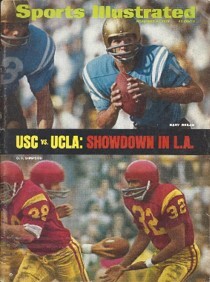 On the topic of football, I'll admit to being puzzled by this description of Saturday's game between UCLA and USC (1:30 p.m., ABC). According to the listings, the teams may be playing for "the highest stakes ever in a college game." Now, it's true that this is a very big game; UCLA is undefeated and ranked #1 in the country, while once-beaten USC is ranked #4; the winner of the game will go to the Rose Bowl; and the teams' best players (quarterback Gary Beban of UCLA and running back O.J. Simpson of USC) are the two favorites to win the Heisman Trophy as player of the year. There's also the unofficial championship of Los Angeles on the line.
On the topic of football, I'll admit to being puzzled by this description of Saturday's game between UCLA and USC (1:30 p.m., ABC). According to the listings, the teams may be playing for "the highest stakes ever in a college game." Now, it's true that this is a very big game; UCLA is undefeated and ranked #1 in the country, while once-beaten USC is ranked #4; the winner of the game will go to the Rose Bowl; and the teams' best players (quarterback Gary Beban of UCLA and running back O.J. Simpson of USC) are the two favorites to win the Heisman Trophy as player of the year. There's also the unofficial championship of Los Angeles on the line.And yet: "the highest stakes ever"? You'll pardon the confusion, but it was almost one year ago to the day (November 19) that Notre Dame played Michigan State in what was being called the "Game of the Century." Notre Dame was undefeated and ranked #1, while Michigan State was undefeated and ranked #2. And while it's true that neither team could go to a bowl game (Michigan State was ineligible, having gone to the Rose Bowl the previous season, while Notre Dame didn't play in bowls at the time), the stakes were much higher: the national championship, which would undoubtedly go to the winner of the game. The number of press credentials issued for the game was higher than for any game ever played at the time (and would go on to include the first few Super Bowls), and an unprecedented demand to watch the game led ABC to tape-delay it to any part of the country that didn't get to see it live. (It also had the largest audience ever to see a college football game on TV.) As I wrote about here , the game changed college football forever, and as big a game as USC-UCLA was, I can't countenance putting it in quite the same category.*
*For the record, Notre Dame and Michigan State tied 10-10, giving Notre Dame the national championship. In a game that was nearly as close, USC defeated UCLA 21-20, on the strength of a missed extra-point.
The highest stakes ever? Granted, it's true that memories are short; there would be another, and better-remembered, Game of the Century played in 1971 between Nebraska and Oklahoma, but I'd have thought the memory would have lasted at least a year.
l l l
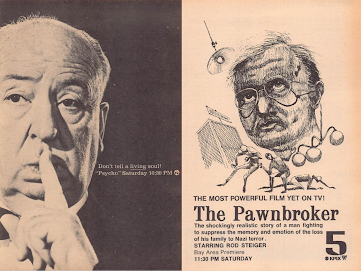 There's more to Saturday than football, though. There are, for example, two absolutely powerhouse movies on in the late night slot. At 10:30 p.m. on KGO, it's the unforgettable Hitchcock shocker Psycho, with Anthony Perkins and Janet Leigh. An hour later, on KPIX, it's "the most powerful film yet on TV," The Pawnbroker, starring Rod Steiger. To have two great movies like these on local television—well, that's what TV used to be like. And to have them on at nearly the same time is what VCRs were made for. But there's more! Earlier in the evening, KOVR is showing The Magnificent Seven (6:30 p.m.), with a magnificent cast headed by Yul Brynner, Steve McQueen, and Eli Wallach. What a night for classic movie lovers—and you didn't even need TCM to achieve it.
There's more to Saturday than football, though. There are, for example, two absolutely powerhouse movies on in the late night slot. At 10:30 p.m. on KGO, it's the unforgettable Hitchcock shocker Psycho, with Anthony Perkins and Janet Leigh. An hour later, on KPIX, it's "the most powerful film yet on TV," The Pawnbroker, starring Rod Steiger. To have two great movies like these on local television—well, that's what TV used to be like. And to have them on at nearly the same time is what VCRs were made for. But there's more! Earlier in the evening, KOVR is showing The Magnificent Seven (6:30 p.m.), with a magnificent cast headed by Yul Brynner, Steve McQueen, and Eli Wallach. What a night for classic movie lovers—and you didn't even need TCM to achieve it. On Sunday, Debbie Reynolds features in her first special, "And Debbie Makes Six!" (8:00 p.m., ABC), with five fabulous guest stars: Bob Hope (confirming my suspicion that Hope appears in every variety special that's ever appeared on television), Jim Nabors, Bobby Darin, Frank Gorshin, and Donald O'Connor (who co-starred with Debbie in Singin' in the Rain). That's a pretty good lineup, even if it does pre-empt The FBI. And we can't forget Ed Sullivan this week (8:00 p.m., CBS); his guests are Eddie Albert; George Hamilton who does a song-and-dance number; Diana Ross and the Supremes; and the Temptations; Flip Wilson; George Carlin; Apache dancers Evon and Astor; and the Muppets. On film: Rex Harrison in a scene from Dr. Doolittle.
Monday, Pernell Roberts reminds us of just how successful his departure from Bonanza was with a guest-starring role on Gunsmoke (7:30 p.m., CBS). Yup, trading one big-time Western for another; I'm not so sure just how good an idea that was. Elsewhere, Sammy Davis Jr. pulls double-duty, first on Danny Thomas's dramatic anthology series (9:00 p.m., NBC), where he plays a World War II soldier wondering if the fellow GI who befriended him (Henry Silva) is really a German spy; then as a guest on The Joey Bishop Show (11:30 p.m., ABC). If you want to catch him on the latter, though, you're going to have to pass up yet another outstanding late-night movie—The Maltese Falcon (11:30 p.m., KPIX in San Francisco), with Humphrey Bogart as private detective Sam Spade, and Mary Astor as the woman he won't play the sap for.
On Tuesday, NBC airs a made-for-TV flick, The Outsider (9:00 p.m.), a pilot for next season's series of the same name, starring Darren McGavin as an ex-con-turned-private detective. Although it was well-regarded by many critics, who welcomed the departure from the smooth, well-dressed jazz detectives we'd become accustomed to, it will run for 26 episodes before departing these mortal coils. And a couple of specials at 10:00 p.m. vie for your attention: on CBS, it's "Gauguin in Tahiti: The Search for Paradise," a documentary recounting the painter's time in Tahiti, narrated by Charles Kuralt, with Sir Michael Redgrave as the voice of Gauguin. Meanwhile, ABC pre-empts The Hollywood Palace (and whose stupid idea was it to move the show from Saturday to Tuesday?) for One-Night Stands, a look at the lives of performers who make their livings touring from city to city. Featured performers include Johnny Rivers, Woody Herman and his Swinging Herd, and the 5th Dimension; Bing Crosby, who knows a thing or two about life on the road, is the narrator.
Wednesday is the fourth anniversary of the assassination of John F. Kennedy, a fact that is commemorated by a Kennedy documentary (9:00 p.m., KTVU in Oakland) narrated by Cliff Robertson, with added insights by Jim Bishop, author of The Day Kennedy Was Shot. On a lighter note, the King Family celebrates Thanksgiving with the first of five holiday programs (7:30 p.m., KXTV in Sacramento). And the Kraft Music Hall goes Country this week, with Dinah Shore hosting "The Nashville Sound" (9:00 p.m., NBC), aided by Ray Charles, Eddy Arnold, Johnny Mercer, the Everly Brothers, and the Stoney Mountain Cloggers.
In Thursday's non-Thanksgiving programming, Cliff Robertson returns, this time as John F. Kennedy, in a rerun of PT 109 (9:00 p.m., CBS), the story of JFK's time as a World War II PT-boat skipper. Judith Crist calls the movie "a kind of comic-book-version-of-history-for-slow-readers," and mentions that when the movie was originally broadcast, she'd described it as "an adventure movie that would appeal to 10-year-old boys of all ages," only to receive objections from 10-year-old boys who thought the age limit should be lower. This movie was released in theaters during Kennedy's lifetime, so don't expect any exploration of the actual circumstances surrounding the sinking of Kennedy's boat. And on Batman (7:30 p.m., ABC), Rudy Vallee and Glynis Johns star as Lord Ffogg and Lady Penelope Peasoup in the first part of a mediocre three-part story that somehow contrives to put Batman, Robin, and Batgirl in "Londinium."
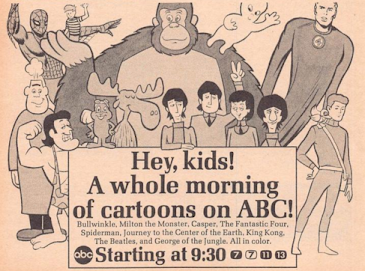 On Friday, it's ABC's annual day-after-Thanksgiving Cartoon Festival, running between 9:30 a.m. and 2:00 p.m. It's one of the things that I miss most about Thanksgiving week, even though I might not have watched any of these cartoons; there was something special about seeing Saturday morning cartoons on Friday that reminded you that this was a bonus day, an extra Saturday if you will, on top of everything that happened yesterday. Of course, one reason why it's not done today is because the networks don't show cartoons on Saturday morning anymore. As a matter of fact, I don't think they show anything on Saturday morning anymore; they leave it to the local stations and their lame E/I programs. Ah, another golden memory gone; I guess college football serves the same function today. In primetime, NBC pre-empts Star Trek (note to programming: in the future, don't pre-empt the program on the cover of this week's issue) for a repeat broadcast of Singer Presents Herb Alpert & the Tijuana Brass (8:30 p.m.), which the ads promote as "the most popular hour special in TV history!" Now, whether they can actually prove that statement or not is, I suppose, questionable, but there's no question that Alpert & Co. were as popular as any group around back in the late 1960s. It's also a great time to be selling sewing machines.
On Friday, it's ABC's annual day-after-Thanksgiving Cartoon Festival, running between 9:30 a.m. and 2:00 p.m. It's one of the things that I miss most about Thanksgiving week, even though I might not have watched any of these cartoons; there was something special about seeing Saturday morning cartoons on Friday that reminded you that this was a bonus day, an extra Saturday if you will, on top of everything that happened yesterday. Of course, one reason why it's not done today is because the networks don't show cartoons on Saturday morning anymore. As a matter of fact, I don't think they show anything on Saturday morning anymore; they leave it to the local stations and their lame E/I programs. Ah, another golden memory gone; I guess college football serves the same function today. In primetime, NBC pre-empts Star Trek (note to programming: in the future, don't pre-empt the program on the cover of this week's issue) for a repeat broadcast of Singer Presents Herb Alpert & the Tijuana Brass (8:30 p.m.), which the ads promote as "the most popular hour special in TV history!" Now, whether they can actually prove that statement or not is, I suppose, questionable, but there's no question that Alpert & Co. were as popular as any group around back in the late 1960s. It's also a great time to be selling sewing machines.l l l
As you probably know by now, we at It's About TV! are dedicated to examining classic television through the microscope of American culture, and nothing could be more American, though lacking in culture, than the Hippie. So we'd be remiss if we passed up Robert Higgins' examination of what Hippies think of television, the ultimate instrument of the establishment? And, perhaps surprisingly, "the tuned-out generation is as tuned in to TV as Ernest Establishment and Company." This insight comes to us courtesy of "combing through a horde of hippie pads," and interviewing representative members "ranging from spokesmen such as poet-writer-musician Ed Sanders of The Fugs, a singing group, to hippie rank-and-filers like Richie (he’s dropped his last name), a former Ashbury-based Digger." Their verdict: "the boob tube was the grove tube."
 The psychedelic artist Peter Max, for instance, sees television as "almost spiritual," while Ed Sanders calls it "hypnotic," and adds that "It’s part of life—like toothpaste and cancer." His bandmate, Ken Weaver, watches TV "all the time." "I watch movies all night, and at 6 a.m. I start the day with Modern Farmer. That’s groovy—all about cattle diseases." (Funny, I never thought about Modern Farmer that way when I was living in the World's Worst Town™.) And Village Voice staffer Don McNeill thinks TV is a "fantastic medium. You can find out where America’s really at by watching TV." Which is what I've been saying here for years.
The psychedelic artist Peter Max, for instance, sees television as "almost spiritual," while Ed Sanders calls it "hypnotic," and adds that "It’s part of life—like toothpaste and cancer." His bandmate, Ken Weaver, watches TV "all the time." "I watch movies all night, and at 6 a.m. I start the day with Modern Farmer. That’s groovy—all about cattle diseases." (Funny, I never thought about Modern Farmer that way when I was living in the World's Worst Town™.) And Village Voice staffer Don McNeill thinks TV is a "fantastic medium. You can find out where America’s really at by watching TV." Which is what I've been saying here for years.Hippies don't pay much attention to the fact that they're often portrayed on television in a negative light. And, oddly, they aren't offended by the materialism implicit in the commercial medium; "[t]hey often dig the commercials more than the programs." Richie says it's because they're on to the "hucksters' hoaxy ways," but Weaver has perhaps a more practical explanation: "When you’re stoned you don’t get so mad at them. Even the soap -commercials. You figure, what the hell; soap’s to wash dirty clothes, man. They can’t make that romantic." They're not always stoned while they're watching, though. "One of the grooviest ways to watch TV," Sanders says, “is to turn on a series like Gunsmoke, turn the sound off and put on a Beatles or, better still, a Fugs record." Hippies also don't seem to mind the violence that infests so much of television. "If people want it," says Sanders, "I say slap it to them. I'm democratic." Adds McNeill, "Hippies aren't particularly anti-violence. Most aren't put off by it."
Even though Hippies are masters of the put-on, they seem to be sincere in their admiration of television. "Young Hippies aren’t going to put down TV," Sanders tells Higgins. "It’s like going to church for them, They’re products of the middle class. Their parents have made sure they can plug back in whenever they want to. They can plug back into the Long Island railroad, the commuter card or TV. Those who haven’t already plugged back in will do so eventually. They'll go back to Jersey and marry the dentist. The only difference is that they’ll turn the dentist on to grass."
As for the influence that Hippies will have on the future of TV, Sanders thinks it will be substantial. "TV is one generation behind. Today's kids will have a lot of power—and they're not going to be buying a lot of what's on TV." Did that come to pass; is that reflected in the television of the 1970s and 1980s? If you see the evolution of television as a linear progression, that would explain a lot.
l l l
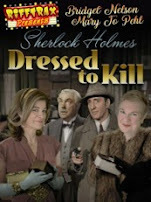 MST3K alert: Dressed to Kill (1946) When banknote plates are stolen from the Bank of England, Sherlock Holmes is called onto the scene. Basil Rathbone, Nigel Bruce, Edmond Breon. (Sunday, 11:15 p.m., KRON in San Francisco) OK, I'm cheating a bit this week; this is actually part of Rifftrax, the spinoff from Mystery Science Theater, featuring two of the stars from MST3K, Bridget Nelson and Mary Jo Pehl. And we don't usually get to see movies that are, well, not bad. But there's still a lot of humor to be mined from the Rathbone-Bruce movies, and don't forget the biscuits! TV
MST3K alert: Dressed to Kill (1946) When banknote plates are stolen from the Bank of England, Sherlock Holmes is called onto the scene. Basil Rathbone, Nigel Bruce, Edmond Breon. (Sunday, 11:15 p.m., KRON in San Francisco) OK, I'm cheating a bit this week; this is actually part of Rifftrax, the spinoff from Mystery Science Theater, featuring two of the stars from MST3K, Bridget Nelson and Mary Jo Pehl. And we don't usually get to see movies that are, well, not bad. But there's still a lot of humor to be mined from the Rathbone-Bruce movies, and don't forget the biscuits! TV
Published on November 18, 2023 05:00
November 17, 2023
Around the dial
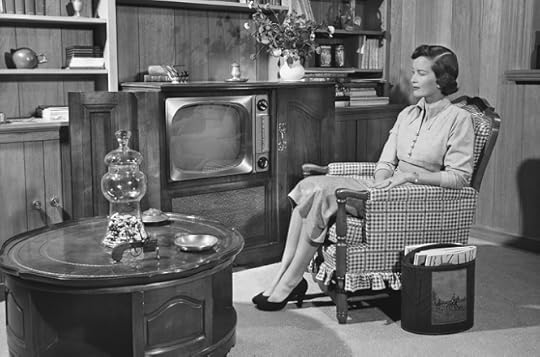
 Xt bare•bones e-zine, Jack's Hitchcock Project leads off this week, with "
Safe Conduct
," Andrew Solt's first teleplay for the show. It's a Cold War thriller from the first season, starring Claire Trevor, Jacques Bergerac, and Werner Klemperer, and Jack's point about it helping if you know something about the political climate of the time shows how important context can be when it comes to television.
Xt bare•bones e-zine, Jack's Hitchcock Project leads off this week, with "
Safe Conduct
," Andrew Solt's first teleplay for the show. It's a Cold War thriller from the first season, starring Claire Trevor, Jacques Bergerac, and Werner Klemperer, and Jack's point about it helping if you know something about the political climate of the time shows how important context can be when it comes to television.There's a "When I was your age" joke about how for people of a certain age, the TV remote control was their son or daughter getting up and changing the channel for them. In fact, however, the wireless remote control goes back to the mid-1950s, as we can see from a Zenith ad for the Flash-Matic , courtesy of the Broadcast Archives.
John's still in the 1970s at Cult TV Blog, and today he's looking at Special Branch , the domestic espionage series that ran on British television between 1969 and 1974. The show can be viewed as having had two distinct versions, each running for two series and having the same premise, but completely different casts and sets. I've seen episodes from the original version; worth checking out.
At The View from the Junkyard, Mike's review of Star Trek: The Animated Series brings him (and us) to " Mudd's Passion ," the third appearance (including the original series) of Harcourt Fenton "Harry" Mudd, the comic relief scoundrel. It's a great episode, but Mike does wonder if it was appropriate for Saturday mornings. If you've seen it, what do you think?
Travalanche pays tribute to Gordon Lightfoot's legendary ballad " The Wreck of the Edmund Fitzgerald ," which has absolutely nothing to do with television, classic or otherwise, but gives me an excuse to talk about Tommy Mischke, a Twin Cities radio host who once interviewed an expert on the wreck by singing all the questions to the tune of the song. Don't believe me? Listen for yourself .
Television's New Frontier: The 1960s moves to the 1962 season of The Bullwinkle Show , one of the funniest, cleverest, and most subversive shows, animated or otherwise, ever to air on television. Perhaps the show had peaked by 1962, which comprised the end of Season 3, all of Season 4, and the beginning of Season 5, but I think it was still going great guns anyway.
Rick Goldschmidt is the official Rankin/Bass historian, and this week he talks about all the problems with the recent Rankin/Bass Christmas Blu-ray and DVD releases, and why you should stay away from them —far away. You have to wonder: just how difficult would it have been to get this right in the first place? And it isn't as if this is the first time something like this has happened.
At A Shroud of Thoughts, Terence pays tribute to Robert Butler , the director responsible for the pilots for both Star Trek, Lois & Clark, and Hill Street Blues, co-created Remington Steele, and directed—well, just about every television show you can think of in a career that stretched from the the 1950s to 2009, including the first episodes of Hogan's Heroes, Batman, Moonlighting, and others. What a career!
And speaking of losses, Ken Squier, the longtime voice of NASCAR on television, died Wednesday night at 88. I've spoken often of "big-game" announcers in sports, and when it comes to auto racing, Squier certainly belongs in that group; his warm voice and good humor, combined with a genuine love of the sport, landed him in the NASCAR Hall of Fame and won a place for him in the hearts of racing fans. As Ryan McGee points out in this tribute at ESPN.com , he was the consummate storyteller in a sport full of great stories. TV
Published on November 17, 2023 05:00
November 15, 2023
Review: 21 Beacon Street (1959), the latest from ClassicFlix
 JOANNA BARNES, DENNIS MORGAN, AND BRIAN KELLY: PART OF THE TEAM OF 21 BEACON STREET
JOANNA BARNES, DENNIS MORGAN, AND BRIAN KELLY: PART OF THE TEAM OF 21 BEACON STREET
The people you see above are part of an elite team, dedicated to providing sophisticated, unorthodox solutions to situations that fall beyond the scope of traditional law enforcement agencies—situations that run the gamut from blackmail to political assassination. In order to achieve their objective, the team concocts elaborate plans based on deception and disguise, not to mention split-second timing. Each member is an expert in one or more areas, and when they bring their talents together, they form an unstoppable unit, one against which the criminal mind has no chance.
Your mission, should you choose to accept it: watch all thirteen episodes of 21 Beacon Street.
And now you can do just that; thanks to our friends at ClassicFlix , the entire run of 21 Beacon Street is available on DVD, in handsomely restored black-and-white episodes transferred from the original 16mm prints held at the UCLA Film & Television Archives for the first time since, I dunno, probably it's original airing.*
*Full disclosure: I received this disc gratis for the purposes of 1) reviewing, and 2) enjoying. Thanks to ClassicFlix for supplying both.
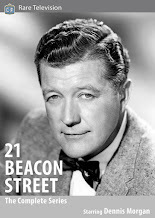 21 Beacon Street originally aired on NBC from July 2 to September 10, 1959, as the summer replacement for The Tennessee Ernie Ford Show. Subsequently, reruns were shown on ABC from December 1959 to March 1960. And, as you might have gathered, the premise bears more than a passing resemblance to that of Mission: Impossible, which came along in 1966--enough so that the show's producer, Filmways, sued Bruce Gellar, creator of M:I, for plagiarism. The suit was settled out of court; in what may or may not have been a related development, Beacon Street's story editor, Laurence Heath*, went on to write several episodes of M:I.
21 Beacon Street originally aired on NBC from July 2 to September 10, 1959, as the summer replacement for The Tennessee Ernie Ford Show. Subsequently, reruns were shown on ABC from December 1959 to March 1960. And, as you might have gathered, the premise bears more than a passing resemblance to that of Mission: Impossible, which came along in 1966--enough so that the show's producer, Filmways, sued Bruce Gellar, creator of M:I, for plagiarism. The suit was settled out of court; in what may or may not have been a related development, Beacon Street's story editor, Laurence Heath*, went on to write several episodes of M:I.
*Laurence Heath's story is a remarkable one in and of itself, and some enterprising scriptwriter out there might want to consider pitching it to some studio. You can read more about it in this piece by Stephen Bowie; our own commentator, Mike Doran, has also added some knowledgeable comments about it at various websites, such as this one.
There are differences, of course. While the Impossible Missions Force is a quasi-governmental agency, 21 Beacon Street is the brainchild of private investigator Dennis Chase (Dennis Morgan), and his clientele consists mostly of private citizens who find themselves in apparently impossible situations. (The show's title refers to the address of Chase's home, where his office is located.) Working with his three-member team—secretary Joanna (Joanna Barnes) savvy attorney Brian (Brian Kelly) and tech expert Jim (James Maloney)*—Chase carefully analyzes the situation and, often working against time, concocts a plan to trap and/or expose the evildoers while thwarting their nefarious schemes. As is the case with the IMF, Chase's plans create situations where not everything—or everyone—is what it seems.
*Not only does each character share the first name of the actor playing them, the pseudonyms used in their various plots also utilize their real first names. Surely that must be some kind of record.
While M:I's episodes had a one-hour running time, allowing for extremely complex (and detailed) setups, 21 Beacon Street episodes clock in at a tidy 30 minutes each, which means that the schemes aren't quite as elaborate, the plans aren't quite as detailed, and the stakes aren't usually as high (except for those retaining Chase's services). Still, the stories are fast-paced and entertaining, and it's always fun to see the team ad lib when things don't go quite as planned. It's also a pleasure, as always, to see guest appearances from familiar faces, including DeForest Kelley, Donna Douglas, Whit Bissell, Jerry Paris, Steve Brodie, Barney Phillips, Harry Bellaver, Sally Fraser, John Hoyt, Paul Richards, and others.
There are no extras save one, but it's an extra that I certainly appreciate. It's sometimes difficult to place these shows in any kind of context; black-and-white, no matter how clear, can make a program look older than it is, and it's often hard to tell whether or not one is watching a network series or a little-scene syndication show. Fortunately, several episodes of 21 Beacon Street include a bonus option to see the original commercials, which, in addition to being fun to watch, help put the show in historical perspective (in one episode, actor Robert Horton shills for the new line of Fords, while we also get to see promos for other ABC series) And each episode includes the standard "ABC Television Presentation" that appeared during the show's repeat run.
While 21 Beacon Street is hardly the greatest DVD release in history, it is a series that was unique for its time, an entertaining and often creative half-hour that serves us classic TV aficionado well. And all credit to ClassicFlix and their Rare Television line; they're perhaps the only company out there still dedicated to bringing to market those little-known series from the 1950s and '60s instead of simply recycling and repackaging the same old titles time after time. You'll remember a while back I reviewed their release of The O. Henry Playhouse, and future titles include the sci-fi espionage series World of Giants with Marshall Thompson, and Angel, Betty White's sitcom from 1960. Even if these shows might not have been on your most wanted list, bravo to ClassicFlix for showing you what you've been missing. TV
Published on November 15, 2023 05:00
November 13, 2023
What's on TV? Friday, November 20, 1970

 I've never lived in St. Louis, and the only time I've even been there has been to make a connecting flight; nonetheless, I've always had something of an affinity for the city, having been able to pick up KMOX radio back when I lived in the World's Worst Town™. So it's always fun to take a look at an issue from St. Louis, as we're doing this week. And you'll notice that one of Dick Cavett's guests tonight is Jake Ehrlich, the attorney who was the basis for Sam Benedict, the 1962-63 legal drama that starred Edmond O'Brien. I've mentioned this series a couple of times; you might recall that NBC urged the family of Jack Ruby to hire Ehrlich when Ruby was about to go on trial for murdering Lee Harvey Oswald. I wonder if the topic came up? At any rate, see what else is on tap for this Friday night before Thanksgiving week. -2- KTVI (ABC)
MORNING
6:30 THOUGHT FOR TODAY—Religion 6:35 FARM REPORT, NEWS 6:45 LONE RANGER 7:15 FURY—Adventure 7:45 CARTOON CARNIVAL -C- 8:15 ROMPER ROOM—Children -C- 9:00 MOVIE—Comedy -C- “The Swan” (1956) 10:50 FASHIONS IN SEWING -C- 11:00 BEWITCHED -C- 11:30 WORLD APART—Serial -C- AFTERNOON 12:00 ALL MY CHILDREN—Serial -C- 12:30 LET’S MAKE A DEAL—Game -C- 1:00 NEWLYWED GAME -C- 1:30 DATING GAME -C- 2:00 GENERAL HOSPITAL—Serial -C- 2:30 ONE LIFE TO LIVE—Serial -C- 3:00 MOVIE—Drama -C- “Woman of Straw” (English; 1964) 5:00 DANIEL BOONE—Adventure -C- EVENING 6:00 ABC NEWS—Frank Reynolds/Howard K. Smith -C- 6:30 BRADY BUNCH -C- 7:00 NANNY -C- 7:30 PARTRIDGE FAMILY -C- 8:00 THAT GIRL -C- 8:30 LOVE, AMERICAN STYLE -C- 9:00 TOM JONES -C- Guests: Jack Jones, Joey Heatherton, Jerry Reed 10:00 NEWS -C- 10:30 MOVIE—Drama -C- “The Young Warriors” (1966) 12:00 DICK CAVETT -C- Guests: Lou Rawls, Jake Ehrlich 1:30 NEWS, SPORTS, MEDITATION
I've never lived in St. Louis, and the only time I've even been there has been to make a connecting flight; nonetheless, I've always had something of an affinity for the city, having been able to pick up KMOX radio back when I lived in the World's Worst Town™. So it's always fun to take a look at an issue from St. Louis, as we're doing this week. And you'll notice that one of Dick Cavett's guests tonight is Jake Ehrlich, the attorney who was the basis for Sam Benedict, the 1962-63 legal drama that starred Edmond O'Brien. I've mentioned this series a couple of times; you might recall that NBC urged the family of Jack Ruby to hire Ehrlich when Ruby was about to go on trial for murdering Lee Harvey Oswald. I wonder if the topic came up? At any rate, see what else is on tap for this Friday night before Thanksgiving week. -2- KTVI (ABC)
MORNING
6:30 THOUGHT FOR TODAY—Religion 6:35 FARM REPORT, NEWS 6:45 LONE RANGER 7:15 FURY—Adventure 7:45 CARTOON CARNIVAL -C- 8:15 ROMPER ROOM—Children -C- 9:00 MOVIE—Comedy -C- “The Swan” (1956) 10:50 FASHIONS IN SEWING -C- 11:00 BEWITCHED -C- 11:30 WORLD APART—Serial -C- AFTERNOON 12:00 ALL MY CHILDREN—Serial -C- 12:30 LET’S MAKE A DEAL—Game -C- 1:00 NEWLYWED GAME -C- 1:30 DATING GAME -C- 2:00 GENERAL HOSPITAL—Serial -C- 2:30 ONE LIFE TO LIVE—Serial -C- 3:00 MOVIE—Drama -C- “Woman of Straw” (English; 1964) 5:00 DANIEL BOONE—Adventure -C- EVENING 6:00 ABC NEWS—Frank Reynolds/Howard K. Smith -C- 6:30 BRADY BUNCH -C- 7:00 NANNY -C- 7:30 PARTRIDGE FAMILY -C- 8:00 THAT GIRL -C- 8:30 LOVE, AMERICAN STYLE -C- 9:00 TOM JONES -C- Guests: Jack Jones, Joey Heatherton, Jerry Reed 10:00 NEWS -C- 10:30 MOVIE—Drama -C- “The Young Warriors” (1966) 12:00 DICK CAVETT -C- Guests: Lou Rawls, Jake Ehrlich 1:30 NEWS, SPORTS, MEDITATION
-4- KMOX (CBS) MORNING 5:45 MEDITATION, NEWS -C- 6:00 SUNRISE SEMESTER -C- Renaissance art 6:30 PS 4—READ, WRITE, SPELL -C- 7:00 CBS NEWS—John Hart -C- 8:00 CAPTAIN KANGAROO -C- 9:00 LUCILLE BALL—Comedy -C- 9:30 BEVERLY HILLBILLIES -C- 10:00 FAMILY AFFAIR -C- 10:30 LOVE OF LIFE—Serial -C- 11:00 WHERE THE HEART IS—Serial -C- 11:25 CBS NEWS—Douglas Edwards -C- 11:30 SEARCH FOR TOMORROW -C- AFTERNOON 12:00 MY FAVORITE MARTIAN -C- 12:30 AS THE WORLD TURNS -C- 1:00 MANY SPLENDORED THING -C- 1:30 GUIDING LIGHT—Serial -C- 2:00 SECRET STORM—Serial -C- 2:30 EDGE OF NIGHT—Serial -C- 3:00 GOMER PYLE, USMC -C- 3:30 MIKE DOUGLAS -C- Guests: Mrs. Lyndon Johnson, Frankie Avalon, Minnesota Fats 5:00 NEWS -C- 5:30 CBS NEWS—Walter Cronkite -C- EVENING 6:00 NEWS -C- 6:30 INTERNS -C- 7:30 HEADMASTER -C- 8:00 MOVIE—Drama -C- “Night Chase” (Made-for-TV; 1970) 10:00 NEWS -C- 10:30 MERV GRIFFIN -C- Guest: Jack Warner 12:00 MOVIE—Adventure -C- “The Black Shield of Falworth” (1954) 1:55 NEWS, MEDITATION
-5- KSD (NBC) MORNING 6:30 FOCUS YOUR WORLD 7:00 TODAY -C- Guests: Ethel Kennedy, Judith Crist 9:00 DINAH SHORE—Variety -C- Guest: Burt Bacharach 9:30 CONCENTRATION—Game -C- 10:00 SALE/CENTURY—Game -C- 10:30 HOLLYWOOD SQUARES -C- Guests: John Davidson, Joanne Dru, Mickey Rooney, Dick Sargent, Karen Valentine, Paul Lynde 11:00 JEOPARDY—Game -C- 11:30 WHO, WHAT OR WHERE -C- AFTERNOON 12:00 NEWS, WEATHER, SPORTS -C- 12:30 WORDS AND MUSIC—Game -C- 1:00 DAYS OF OUR LIVES—Serial -C- 1:30 DOCTORS—Serial -C- 2:00 ANOTHER WORLD/BAY CITY -C- 2:30 MOVIE GAME -C- 3:00 ANOTHER WORLD/SOMERSET—Serial -C- 3:30 STUMP THE STARS—Game -C- 4:00 VIRGINIA GRAHAM—Variety -C- Guests: Pamela Mason, Pat McCormick, John Stewart 5:00 NEWS -C- 5:30 NBC NEWS -C- EVENING 6:00 NEWS -C- 6:30 HIGH CHAPARRAL -C- 7:30 NAME OF THE GAME -C- 9:00 BRACKEN’S WORLD -C- 10:00 NEWS -C- 10:30 JOHNNY CARSON -C- Guests: George Burns, Telly Savalas, Charles Nelson Reilly 12:00 NEWS, WEATHER, SPORTS -C- 12:30 26 MEN—Western 1:00 WEATHER
-9- KETC (PBS) AFTERNOON 3:30 BRIDGE—Instruction 4:00 SESAME STREET Guest: Pete Seeger 5:00 MISTEROGERS—Children 5:30 WHAT’S NEW—Children EVENING 6:00 CAREERS CALLING 6:30 PUT IT IN WRITING 7:00 PLAYING THE GUITAR 7:30 PUPPET MASTER 8:00 NET JOURNAL—Documentary 9:30 YOGA FOR EVERYONE 10:00 SEE TO SOLVE 10:30 EPILOGUE 11:00 CHORAL GROUP
11 KPLR (IND.) MORNING 8:00 UNDERDOG—Children -C- 8:30 CARTOONS -C- 9:30 JACK LaLANNE—Exercise -C- 10:00 GAME GAME -C- Celebrities: Chelsea Brown, Alejandro Rey, Kaye Stevens 10:30 THAT GIRL -C- 11:00 TO TELL THE TRUTH—Game -C- Panel: Kitty Carlisle, Peggy Cass, Durward Kirby, Gene Rayburn. Substitute host: Bill Cullen 11:30 WHAT’S MY LINE?—Game -C- Panelists: Arlene Francis, Anita Gillette, Gawn Grainger, Soupy Sales AFTERNOON 12:00 NEWS, WEATHER, SPORTS -C- 12:30 GALLOPING GOURMET -C- Bacon-filled pancakes topped with apples 1:00 MOVIE—Drama “Demetrius and the Gladiators" (1954) 3:30 FLINTSTONES—Children -C- 4:00 GILLIGAN’S ISLAND -C- 4:30 FLIPPER—Drama -C- 5:00 LEAVE IT TO BEAVER—Comedy 5:30 I LOVE LUCY—Comedy EVENING 6:00 DICK VAN DYKE—Comedy 6:30 TRUTH OR CONSEQUENCES -C- 7:00 BIG VALLEY—Western -C- 8:00 WAGON TRAIN—Western 9:00 PERRY MASON—Mystery 10:00 ALFRED HITCHCOCK—Drama 10:30 MOVIE—Drama “Unconquered” (1947) 1:15 SEA HUNT—Adventure Time approximate 1:45 NEWS, MEDITATION
30 KDNL (IND.) MORNING 9:15 FINANCIAL REPORTS -C- AFTERNOON 3:00 LITTLE CASTLE -C- 4:00 ULTRAMAN—Children -C- 4:30 LOST IN SPACE—Adventure -C- 5:25 TRICK AND TREAT -C- 5:30 BATMAN—Adventure -C- Guest villain: Milton Berle (Louie the Lilac) EVENING 6:00 MUNSTERS—Comedy 6:30 FLYING NUN -C- 7:00 WILD WILD WEST -C- 8:00 MOVIE—Fantasy -C- “Black Sabbath” (Italian-French; 1963) 10:00 MOVIE—Western -C- “Rio Bravo” (1959)
TV
Published on November 13, 2023 05:00
November 11, 2023
This week in TV Guide: November 14, 1970

 Christopher George is one intense cat, and Arnold Hano means that literally; when you're around him, you're reminded of jungle images, and George "paces like a jungle cat, just out of camera range," as he waits for a scene to be shot. That intensity comes through, "[n]o matter how inane the role." Witness a shaving-cream commercial he made in 1962; he played a man shaving just before his honeymoon night. When his bride admires his smooth skin, he purrs, "It's all for you." "I put everything into that 'all for you'," George remembers. Not only did the ad win an award, viewers reacted. "Girls chased me down 57th Street in New York. I had to jump into a cab to get away. The mail was unreal." He made more than $30,000 for that commercial. For shaving cream.
Christopher George is one intense cat, and Arnold Hano means that literally; when you're around him, you're reminded of jungle images, and George "paces like a jungle cat, just out of camera range," as he waits for a scene to be shot. That intensity comes through, "[n]o matter how inane the role." Witness a shaving-cream commercial he made in 1962; he played a man shaving just before his honeymoon night. When his bride admires his smooth skin, he purrs, "It's all for you." "I put everything into that 'all for you'," George remembers. Not only did the ad win an award, viewers reacted. "Girls chased me down 57th Street in New York. I had to jump into a cab to get away. The mail was unreal." He made more than $30,000 for that commercial. For shaving cream.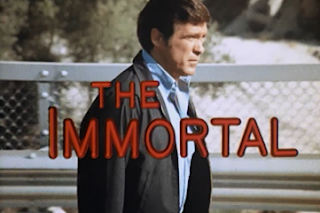 Chris George, late of The Rat Patrol and currently star of The Immortal ("out of Superman by way of The Fugitive"), brings that same intensity to his real life. He complains constantly about the quality of Immortal scripts. "You want to replace me?" he growls at a producer. "Who is this man I'm supposed to be playing?" To Hano, he confides, "Some of the scripts are rotten. In one they've got me playing an introspective character who practically sucks his thumb. In the next I'm a finger-snapping, gum-chewing wise guy. The scriptwriters don't know what they're doing." It might be why The Immortal will be cancelled in January after 15 episodes (plus a pilot), without the show's key premise—a man whose rare blood makes him immortal, being pursued by a billionaire who wants the blood so he can be immortal—is never resolved.
Chris George, late of The Rat Patrol and currently star of The Immortal ("out of Superman by way of The Fugitive"), brings that same intensity to his real life. He complains constantly about the quality of Immortal scripts. "You want to replace me?" he growls at a producer. "Who is this man I'm supposed to be playing?" To Hano, he confides, "Some of the scripts are rotten. In one they've got me playing an introspective character who practically sucks his thumb. In the next I'm a finger-snapping, gum-chewing wise guy. The scriptwriters don't know what they're doing." It might be why The Immortal will be cancelled in January after 15 episodes (plus a pilot), without the show's key premise—a man whose rare blood makes him immortal, being pursued by a billionaire who wants the blood so he can be immortal—is never resolved.George sees himself as a man who came "too late" to acting, in a time when the industry is ruled not by creative people but bookkeepers and accountants, and when profitability rules over all. But he's been in the business for nine years, and he's a survivor. He survived The Rat Patrol, through the internecine warfare at the upper levels of production, at having to live "in garbage cans," of a series that ran for two years and ended $1.8 million in the red. And that bit about "survival" should be taken literally as well; during the run of the series he twice dislocated his left should, three times dislocated his right, broke a hand, sprained a knee, suffered multiple brain concussions, broke his back in a jeep accident, and contracted dysentery. (Those injuries could have contributed to his death in 1983 at age 52.)
And yet, for all this, Chris George loves acting, unlike his wife, Lynda ("who if she isn't the most beautiful blonde in Hollywood is surely in the top 3), who doesn't much enjoy it. Yes, despite all these complaints, he loves acting. Comparing himself to a lion in the jungle who turns down the chance for a cushy life in a zoo, "I've got to do my own thing. Even if it kills me."
l l l
 Throughout the 60s and early 70s, TV Guide's weekly reviews were written by the witty and acerbic Cleveland Amory. Whenever we get the chance, we'll look at Cleve's latest take on the shows of the era.
Throughout the 60s and early 70s, TV Guide's weekly reviews were written by the witty and acerbic Cleveland Amory. Whenever we get the chance, we'll look at Cleve's latest take on the shows of the era. The Odd Couple, ABC's new sitcom based on the hit Neil Simon play and movie, was, according to Cleveland Amory, made to order for television. It presents the viewer with not one, but two "poor, dumb" bachelors, trying to make a go of life on their own. And the two are as different as night and day, "broad and slapsticky and so different you don't need a program to tell them apart." Felix (Tony Randall) is a photographer, "neat and tidy and fussy and prissy. He likes opera and squash and hangs his socks on a hanger." Oscar (Jack Klugman) is a sportswriter, "crass and brassy and a girl chaser. He is messy and sloppy and even slobby." On Broadway they were played by Art Carney and Walter Matthau; in the movies they were Jack Lemmon and Matthau.
And this, Amory says, is a key to appreciating The Odd Couple: "Given television's boundaries, Klugman and Randall are actually better than their predecessors." Even through their broad characters, the actors give them point—"Klugman something besides vulgarity, Randall something besides neurosis. And, at the same time, they never forget that the main point is to be funny." After a failed evening with the Pigeon sisters, Oscar lays it on Felix. "Your idea of a fun evening is defrosting the icebox. You've ruined another evening with your tidying and your cleaning and your fussing." But Felix doesn't take it lying down. Referring to Oscar's bedroom, he plays the part of the responsible one. "There are things growing down there. Lawrence of Arabia couldn't get through that dust." In another episode, after Felix has ruined yet another of Oscar's plans, he asks him if there's something he'd like to do now. "Yeah," replies Oscar, "but I've got to make it look like an accident."
It is funny, and Klugman and Randall make it funnier. True, Cleve opines, it may well disappoint those who saw the play on Broadway or the movie. And anyone who objects to "slightly blue lines" is going to be annoyed. But, in a way, that's the point of the whole thing; what made the play and movie funny was that roughness, and the producers have succeeded in transferring that to television, "again, given television's boundaries." So if you haven't seen the most recent episode, don't miss the next one. "It may not be as funny," Amory says, "but the chances are it'll be funnier than any other situation comedy on your screen this season." And that about says it; during its five seasons, The Odd Couple was never a ratings smash, but it was, and remains, a show much loved by the many who remember it.
l l l
We don't have Sullivan vs. The Palace anymore. Oh, Ed's still around for another season, but The Hollywood Palace made its final curtain call at the beginning of the year. That doesn't mean we don't have a variety of variety shows to look at, though—in fact, there's one for every night of the week. And, as always, variety shows are a great indicator of who's star is shining at any given time.
Things get started on Saturday with the syndicated Vikki Carr Show (3:30 p.m., KMOX in St. Louis), with Bobby Vee and the New Christy Minstrels as Vikki's guests. As we move into primetime, it's the latest incarnation of The Andy Williams Show (6:30 p.m. CT) featuring guest stars Leslie Uggams, Ken Berry, and Claudine Longet, i.e. Mrs. Williams. That goes up against KPLR and their syndicated lineup of Country shows, including Country Carnival at 4:30 p.m., Country Place at 5:00, That Good Ole Nashville Music, with Roy Acuff, at 5:30, The Wilburn Brothers at 6:00, Porter Wagoner at 6:30, Stan Hitchcock at 7:00, Buck Owens at 7:30, Bill Anderson at 8:00, and Nashville Now at 8:30. Not my kind of music, but that's quite a lineup. And to round the evening off, Hugh Hefner's show (12:30 a.m., KSD) features Milton Berle, Barrie Chase, Jo Anne Worley, and Tony Joe White; it's probably the best lineup of the night.
 On Sunday, the aforementioned Sullivan show features ballerina Natalia Makarova, who recently defected from the Soviet Union (remember when events like that were a big deal?) and will be dancing with the American Ballet Theatre's Ted Kivitt; comedians Dick Gregory and Jeremy Vernon; British musical-comedy star Norman Wisdom; singers Abbe Lane, Tommy Roe, Billy Joe Royal and Joe South; and racing drivers Stirling Moss, Dan Gurney, Jackie Stewart and Graham Hill, competing in a miniature-car race—I'd give Ed the edge over anyone else based on them alone. (7:00 p.m., CBS) Up against that is The Klowns, an hour-long circus show hosted by Sammy Davis Jr., with Jerry Lewis, Juliet Prowse, Charlie Callas, Don Rickles, the Smothers Brothers, and three acts from the Ringling Bros. and Barnum & Bailey Circus. (7:00 p.m., ABC) Sullivan's show is part of a three-hour block of variety shows; it's followed at 8:00 by The Glen Campbell Goodtime Hour, with Dean Martin, Anne Murray, and John Byner; then at 9:00, it's The Tim Conway Comedy Hour, with Carol Burnett and Steve Lawrence.
On Sunday, the aforementioned Sullivan show features ballerina Natalia Makarova, who recently defected from the Soviet Union (remember when events like that were a big deal?) and will be dancing with the American Ballet Theatre's Ted Kivitt; comedians Dick Gregory and Jeremy Vernon; British musical-comedy star Norman Wisdom; singers Abbe Lane, Tommy Roe, Billy Joe Royal and Joe South; and racing drivers Stirling Moss, Dan Gurney, Jackie Stewart and Graham Hill, competing in a miniature-car race—I'd give Ed the edge over anyone else based on them alone. (7:00 p.m., CBS) Up against that is The Klowns, an hour-long circus show hosted by Sammy Davis Jr., with Jerry Lewis, Juliet Prowse, Charlie Callas, Don Rickles, the Smothers Brothers, and three acts from the Ringling Bros. and Barnum & Bailey Circus. (7:00 p.m., ABC) Sullivan's show is part of a three-hour block of variety shows; it's followed at 8:00 by The Glen Campbell Goodtime Hour, with Dean Martin, Anne Murray, and John Byner; then at 9:00, it's The Tim Conway Comedy Hour, with Carol Burnett and Steve Lawrence.Monday is a night of big names on NBC, starting with The Red Skelton Show (6:30 p.m.), with guest Godfrey Cambridge as football star Joe Broadway, managed by San Fernando Red. That's followed by Rowan and Martin's Laugh-In (7:00 p.m.), featuring Bob Newhart playing an NBC prop man. At 8:00 p.m., it's a Bob Hope special, with Bob's third annual vaudeville show; special guests are Lucille Ball, George Burns, Tom Jones, and Danny Thomas. The night winds up with another special celebrating Jack Benny's 20th TV Anniversary, featuring highlights from 20 years of Jack's shows, and including guests Bob Hope, Frank Sinatra, Dinah Shore, Lucille Ball, Dean Martin, Red Skelton, and Jack's wife Mary Livingston. Sounds like a lot of the same people we've been reading about already, doesn't it? CBS counters with The Carol Burnett Show (9:00 p.m.), with Ross Martin and Martha Raye.
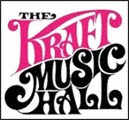 Have you noticed how big Country music shows are in 1970? And I'm not talking about the Countrified pop crap that you see so much today, but the real thing. In addition to that strip of twangy shows that KPLR had on Saturday, Tuesday has Hee Haw (still on its network run) with special guest Charley Price. (7:30 p.m., CBS), and on Wednesday it's The Johnny Cash Show, with guests Kris Kristofferson, Cass Elliot, and Lorne Greene (8:00 p.m., ABC). After all that, I was so hoping Eddy Arnold was hosting one of the Country-flavored editions of Kraft Music Hall (8:00 p.m., NBC); alas, it's "Don Adams Investigates The Detectives," a musical-comedy satire on famous sleuths (no offense meant to Don, of course), with Raymond Burr, Will Jordan, Elisha Cook, and David Janssen. And I'll bet they've got some Thanksgiving recipes on the commercials.
Have you noticed how big Country music shows are in 1970? And I'm not talking about the Countrified pop crap that you see so much today, but the real thing. In addition to that strip of twangy shows that KPLR had on Saturday, Tuesday has Hee Haw (still on its network run) with special guest Charley Price. (7:30 p.m., CBS), and on Wednesday it's The Johnny Cash Show, with guests Kris Kristofferson, Cass Elliot, and Lorne Greene (8:00 p.m., ABC). After all that, I was so hoping Eddy Arnold was hosting one of the Country-flavored editions of Kraft Music Hall (8:00 p.m., NBC); alas, it's "Don Adams Investigates The Detectives," a musical-comedy satire on famous sleuths (no offense meant to Don, of course), with Raymond Burr, Will Jordan, Elisha Cook, and David Janssen. And I'll bet they've got some Thanksgiving recipes on the commercials.The fun continues on Thursday with The Flip Wilson Show (6:30 p.m.), and Flip's guests, Marcel Marceau, Arte Johnson, Moms Mabley, and Cajun fiddler Doug Kershaw. (I knew we'd keep that Country theme going.) And at 7:00 p.m., The Jim Nabors Hour (CBS) has Don Rickles and singer Karen Wyman, in a salute to the English music hall. Finally (for tonight, anyway), The Dean Martin Show (9:00 p.m., NBC) welcomes Vikki Carr, the Temptations, and English comic Billy Baxter.
Sammy Davis Jr. is back on Friday, but it's not in a variety show; instead, he's a guest on part one of a two-part Name of the Game (7:30 p.m., NBC), playing soul singer superstar Billy Baker; Ray Charles, Tony Martin, Marilyn Michaels, Jack Carter, Norm Crosby, and Redd Foxx also appear in an episode that might as well be a variety special, don't you think? And wrapping up the week, Tom Jones has his first London special of the season, with Jack Jones, Joey Heatherton, and Jerry Reed. (9:00 p.m., ABC) And they said the variety show was dead; I don't know about you, but I'm exhausted just typing all this. Did I miss anyone?
l l l
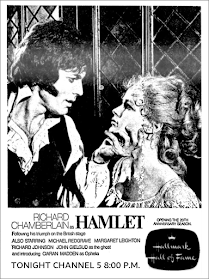 A couple of additional programs to report on this week: On Tuesday, the Hallmark Hall of Fame opens its 20th season with "Hamlet," starring Richard Chamberlain, (8:00 p.m., NBC) You might not think of Dr. Kildare as your first choice to play the role, but Chamberlain won raves in Britain last year when he became the first American Hamlet since John Barrymore. He's backed by a heavyweight supporting cast, including Michael Redgrave as Polonius, Margaret Leighton as Gertrude, John Gielgud as the Ghost, and Martin Shaw as Horatio. As
you can see here
, it's a handsome production, set in Europe of the 1800s, as opposed to the bleak and minimal versions that one often sees nowadays.
A couple of additional programs to report on this week: On Tuesday, the Hallmark Hall of Fame opens its 20th season with "Hamlet," starring Richard Chamberlain, (8:00 p.m., NBC) You might not think of Dr. Kildare as your first choice to play the role, but Chamberlain won raves in Britain last year when he became the first American Hamlet since John Barrymore. He's backed by a heavyweight supporting cast, including Michael Redgrave as Polonius, Margaret Leighton as Gertrude, John Gielgud as the Ghost, and Martin Shaw as Horatio. As
you can see here
, it's a handsome production, set in Europe of the 1800s, as opposed to the bleak and minimal versions that one often sees nowadays.Also on Tuesday, it's one of the ABC Movie of the Week presentations that many will remember fondly: The Over-the-Hill Gang Rides Again (7:30 p.m.), a sequel to last year's Over-the-Hill Gang movie. It's your run-of-the-mill movie, with the highlight definitely being a cast that includes Fred Astaire, Walter Brennan, Edgar Buchanan, Andy Devine, Chill Wills, and Parley Baer; Paul Richards and Lana Wood are on hand as younger faces. Says Judith Crist, it's "designed for Golden Agers and movie buffs who get a bang out of seeing familiar faces."
l l l
ABC's rotating cast of news anchors has taken another turn, reports Richard K. Doan, as the network turns to CBS veteran Harry Reasoner in its search for ratings success. Reasoner, who's been the long-time second anchor on the evening news (filling in for Walter Cronkite when necessary), will replace Frank Reynolds as Howard K. Smith's co-anchor beginning December 7. Reynolds has come under increasing fire for his outspoken liberal commentaries, recently calling for a total ban on TV advertising, but Elmer W. Lower, president of ABC News, insists that this had nothing to do with Reynolds' replacement. "Reasoner is 'simply a bigger box-office star,'" Lower says. "He has great independence of mind, too, and will do commentaries twice a week." Reynolds, meanwhile, is being reassigned to special segments.
 As longtime readers know, I'm an admirer of both Reasoner and Reynolds (and Smith too, for that matter); when I was in my formative years, the Smith-Reasoner evening news was my preferred news broadcast—when I could see them, that is, given that I spent many of those years living in the World's Worst Town™. And while Reynolds' politics diverged from mine, I always found him a straightforward, dignified, and likeable presence. Of course, that rotating cast will continue to turn; eventually Howard K. Smith will be replaced by Barbara Walters (a terrible move), and partly as a result of that, Reasoner winds up going back to CBS. And when Roone Arledge comes in as head of ABC News and creates World News Tonight, he brings back former anchor Peter Jennings as London correspondent, and as the main anchor, he turns to—Frank Reynolds. A good move.
As longtime readers know, I'm an admirer of both Reasoner and Reynolds (and Smith too, for that matter); when I was in my formative years, the Smith-Reasoner evening news was my preferred news broadcast—when I could see them, that is, given that I spent many of those years living in the World's Worst Town™. And while Reynolds' politics diverged from mine, I always found him a straightforward, dignified, and likeable presence. Of course, that rotating cast will continue to turn; eventually Howard K. Smith will be replaced by Barbara Walters (a terrible move), and partly as a result of that, Reasoner winds up going back to CBS. And when Roone Arledge comes in as head of ABC News and creates World News Tonight, he brings back former anchor Peter Jennings as London correspondent, and as the main anchor, he turns to—Frank Reynolds. A good move.In other news from The Doan Report, CBS's second-season plans are coming into focus. In addition to cancelling The Tim Conway Comedy Hour, the network is planning on dropping either The Governor and J.J. or To Rome with Love in favor of "a satirical venture tentatively titled All in the Family." The new show is an Americanized version of the former British hit, Till Death Us Do Part, a show "which managed to insult all minorities." CBS president Robert Wood is said to be determined to "hang his hat on this one," seeing the new sitcom as analogous to NBC's Laugh-In in its ability to "enliven TV." Time will tell, I suppose.
l l l
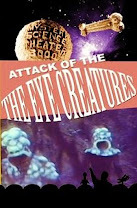 MST3K alert: The Eye Creatures (1945) The strange inhabitants from a flying saucer terrify a lovers' lane. John Ashley, Cynthia Hull, Warren Hammack, Chet Davis, Bill Peck. (Saturday, 8:00 p.m., KDNL) As you can see from the picture at the left, the original title was rendered in a stylized logo. When the movie was re-released as Attack of the Eye Creatures, whoever was in charge of graphic embellishments inexplicably added "Attack of the" to the title, meaning that it reads literally as, well, Attack of the The Eye Creatures. No fan of MST3K would ever refer to it any other way. And I think that tells you just about everything you need to know about this movie.
TV
MST3K alert: The Eye Creatures (1945) The strange inhabitants from a flying saucer terrify a lovers' lane. John Ashley, Cynthia Hull, Warren Hammack, Chet Davis, Bill Peck. (Saturday, 8:00 p.m., KDNL) As you can see from the picture at the left, the original title was rendered in a stylized logo. When the movie was re-released as Attack of the Eye Creatures, whoever was in charge of graphic embellishments inexplicably added "Attack of the" to the title, meaning that it reads literally as, well, Attack of the The Eye Creatures. No fan of MST3K would ever refer to it any other way. And I think that tells you just about everything you need to know about this movie.
TV
Published on November 11, 2023 05:00
November 10, 2023
Around the dial
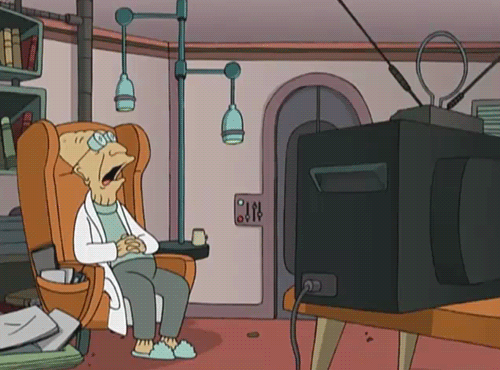
 Automobiles have long been a major part of American culture, and with them, the service station. We think of them as gas stations now because we serve ourselves, but back in the day, "service" meant something, and David looks back at those days at Comfort TV, and the role
service stations have played on television
., I've made mention before of how local movie shows used to have titles, such as The Late Show or, as we see here at the Broadcast Archives, Armchair Theater. They also used to have hosts, and as
this ad reminds us
, it's important to create a good title and have a good, personable emcee. "TV, after all, is a very intimate medium."
Automobiles have long been a major part of American culture, and with them, the service station. We think of them as gas stations now because we serve ourselves, but back in the day, "service" meant something, and David looks back at those days at Comfort TV, and the role
service stations have played on television
., I've made mention before of how local movie shows used to have titles, such as The Late Show or, as we see here at the Broadcast Archives, Armchair Theater. They also used to have hosts, and as
this ad reminds us
, it's important to create a good title and have a good, personable emcee. "TV, after all, is a very intimate medium."At Cult TV Blog, John continues his series on Seventies television with the 1972 series Villains , a show which faced the then-challenging premise of creating a series about a group of antiheroes: thieves who rob a bank, are imprisoned, and escape. Nowadays we're accustomed to antiheroes; we might even be conditioned to expect them. But back then, I don't think it was so easy.
It's time to return to The Avengers at The View from the Junkyard, as Roger and Mike review " Never, Never Say Die ," a Steed/Mrs. Peel episode made memorable by an electrifying performance from the great Christopher Lee. I reviewed this episode myself a couple of years ago; see what our erstwhile critics say here, and compare notes.
Travalanche has three posts on shows from the classic era, and they're all worth reading: the many shows sponsored by Chevrolet , including but not limited to Dinah Shore; The Patti Page Oldsmobile Show , starring (surprise!) singer Patti Page; and, in a break from the automotive business, The Ed Wynn Show , starring the Perfect Fool himself.
At A Shroud of Thoughts, Terence pays tribute to a handful of figures who've passed on in the last few weeks, and doesn't it seem as if we've been saying that a lot this year? He remembers the work of Richard Moll here , and a trio of familiar faces here , including Matthew Perry of Friends. I must confess that I've never, ever seen a moment of Friends, and while I don't feel as if I've missed anything, I'm well aware of Matthew Perry's talent, and the outpouring of emotion in the wake of his death testifies to the impact he made on viewers throughout his career. TV
Published on November 10, 2023 05:00
November 8, 2023
The Descent into Hell: "The Horn Blows at Midnight" (1953)
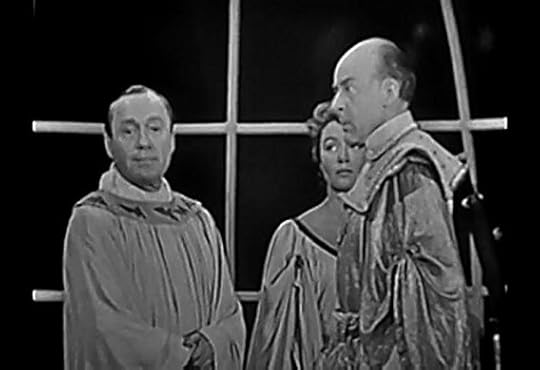
This is the way the world endsNot with a bang but a whimper.—T.S. Eliot, The Hollow Men
 TThere's a thin line between comedy and tragedy; it's why the symbols of the theater are the laughing mask and the crying mask, Thalia and Melpomene: always together, two sides of the same coin.
TThere's a thin line between comedy and tragedy; it's why the symbols of the theater are the laughing mask and the crying mask, Thalia and Melpomene: always together, two sides of the same coin. It's true, though, that you'd be hard-pressed to find much comedy in these stories, although the absurdity of what we've allowed ourselves to be subjected to would be laughable if it weren't so tragic. So perhaps it's well that this final story—the only one to deal with the actual end of the world—is a comedy. One with strings attached, however, because it ends with mankind being given another chance—a last chance.
I
 The Chief of the Department of Small Planet Management in Heaven (Lester Matthews) has just received a directive from the Front Office regarding Planet 33974. For too long, that "nasty little globe," a place where power and plunder has become more important than gentleness and humanity, has been the source of nothing but headache. They've been warned enough—war every 20 years, two million crimes per annum, greed, intolerance, and persecution. The order is simple and to the point: Planet 33974 must be destroyed. The Chief's assistant, Elizabeth (Dorothy Malone) hands him the file on Planet 33974: Earth.
The Chief of the Department of Small Planet Management in Heaven (Lester Matthews) has just received a directive from the Front Office regarding Planet 33974. For too long, that "nasty little globe," a place where power and plunder has become more important than gentleness and humanity, has been the source of nothing but headache. They've been warned enough—war every 20 years, two million crimes per annum, greed, intolerance, and persecution. The order is simple and to the point: Planet 33974 must be destroyed. The Chief's assistant, Elizabeth (Dorothy Malone) hands him the file on Planet 33974: Earth. The destruction of the planet will be simple enough: an angel must travel to Earth—the top floor of the Waldorf Biltmore Hotel in New York City, to be precise—at exactly 12:00 midnight, blow five notes on a special trumpet, and voila! no more Earth. Elizabeth suggests her boyfriend Athaneal for the job, but The Chief groans; he considers Athaniel to be a nincompoop who's failed in every assignment, but Elizabeth insists he can do it—after all, he's a trumpet player in the Heavenly orchestra ("The Sweetest Music the Other Side of Heaven.")
When the call comes, Athaneal (Jack Benny), Angel Junior Grade, 3rd Phalanx, 15th Cohort, is in the process of being thrown out of the orchestra by Beethoven, who is tired of Athaneal always botching the opening measure to his Fifth Symphony. Upon being told of the assignment, Athaneal pauses—Earth is his home planet, where he died 300 years ago—but he assures The Chief that he can carry out the mission. The Chief hands him the precious trumpet, and reminds him that it must be blown exactly at midnight: 11:59 p.m. won't do, 12:01 a.m. won't do. If Athaneal is successful, The Chief promises him a promotion to Angel Senior Grade.
Upon arriving in New York City, Athaneal overhears a young couple quarreling. Danny is a young trumpet player in a radio orchestra. His girlfriend Helen wants him to give it up for a real job so they can get married, but Danny refuses: being a musician is "what I know, it's what I do." This touches Athaneal, as it mirrors a conversation he and Elizabeth had before he left for earth. He urges the couple to set aside their differences and enjoy their time together, but Danny storms off, taking Athaneal's trumpet case by mistake.
After realizing what has happened, Athaneal hails a cab and races to the Waldorf, where Danny's orchestra plays. On the way there, he listens as the driver recites the world's various woes. I've already gone through one war, he tells Athaneal, and my kid went through another. "Einstein says the next war will be fought with atomic bombs, and then the next war after that will be fought with rocks."
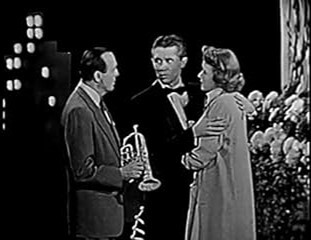 As the midnight hour approaches, Athaneal, Danny, and Helen all converge at the rooftop garden of the Waldorf. After retrieving his trumpet from Danny, Athaneal reveals to them his true identity, and that in four minutes he will blow his trumpet and destroy the Earth. "You only have four minutes to live. Are you going to spend those four minutes just fighting with each other?" They finally get the idea. Danny is skeptical, but Helen tells him that with the world as it is, anything could happen at any minute. "Suppose we did have only four more minutes to live," she asks him. "We've wasted all our precious time." If only they knew in advance when the world would end, they could make every second a happy one. "Holding each other close would be the most important in all the world." Realizing the truth of what Athaneal has said, they return inside arm-in-arm, leaving the angel alone in the garden, holding his trumpet as the minute hand moves toward midnight. And here he pauses.
As the midnight hour approaches, Athaneal, Danny, and Helen all converge at the rooftop garden of the Waldorf. After retrieving his trumpet from Danny, Athaneal reveals to them his true identity, and that in four minutes he will blow his trumpet and destroy the Earth. "You only have four minutes to live. Are you going to spend those four minutes just fighting with each other?" They finally get the idea. Danny is skeptical, but Helen tells him that with the world as it is, anything could happen at any minute. "Suppose we did have only four more minutes to live," she asks him. "We've wasted all our precious time." If only they knew in advance when the world would end, they could make every second a happy one. "Holding each other close would be the most important in all the world." Realizing the truth of what Athaneal has said, they return inside arm-in-arm, leaving the angel alone in the garden, holding his trumpet as the minute hand moves toward midnight. And here he pauses.At every act of kindness he has encountered, Athaneal's doubts about his mission have increased, leaving him to wonder if The Chief realizes the true nature of the situation. Now, speaking directly to him, Athaneal pleads for the lives of those on Earth. Take Danny and Helen—"They're not bad people, and they're so much in love—how can they be bad? They shouldn't be destroyed." He thinks back to the others he's met along the way: two young shoeshine boys he met upon his arrival, who were so nice to him; the friendly news dealer who helped him find Danny; the little old lady he sat next to in the hotel lobby, planning a trip around the world after winning a contest. There are millions like them all over the world, just looking for a little happiness; don't they all deserve another chance? Moved by Athaneal's plea, The Chief relents, giving the planet and its people that one—final?—chance.
II
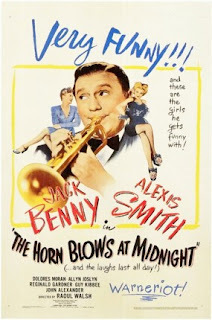 One of Jack Benny's greatest running gags (along with his stinginess and being eternally 39) was the movie The Horn Blows at Midnight. It had not been particularly successful in its theater run in 1945, underperforming at the box office and receiving lukewarm reviews by the press. Several reasons were proffered for its failure: President Roosevelt had died just eight days before the film's release, and the Rodgers and Hammerstein musical Carousel, which dealt much more successfully with the theme of the spirit world, had just opened on Broadway. Mostly, though, it just didn't quite have it; as New York Post critic Winston Archer wrote, "the comic fantasy doesn't come off as planned. The big build-up remains an architectural and overworked effort."
One of Jack Benny's greatest running gags (along with his stinginess and being eternally 39) was the movie The Horn Blows at Midnight. It had not been particularly successful in its theater run in 1945, underperforming at the box office and receiving lukewarm reviews by the press. Several reasons were proffered for its failure: President Roosevelt had died just eight days before the film's release, and the Rodgers and Hammerstein musical Carousel, which dealt much more successfully with the theme of the spirit world, had just opened on Broadway. Mostly, though, it just didn't quite have it; as New York Post critic Winston Archer wrote, "the comic fantasy doesn't come off as planned. The big build-up remains an architectural and overworked effort."The movie had one great post hoc promoter, though: Jack Benny. Benny quickly made "The Horn Blows at Midnight" a continuing joke that would run through the remainder of his career. (One of my favorite Benny bits comes from a 1957 episode of his TV show: Benny is driving to 20th Century Fox to discuss a movie based on his life. At the front gate, he casually asks the guard (played by Benny regular Mel Blanc) if he ever saw the movie. "Saw it?", cried Blanc. "I directed it!") His jokes, of course, gave the movie far more publicity than it would have gotten otherwise, burnishing Benny's reputation for self-deprecating humor, and helping the movie recoup its investment. Although it was Benny's final starring role in a movie—"When the horn blew at midnight," he once said, "it blew taps for my movie career"—it also became one of his best-known, even for people who never saw it.
A radio version of The Horn Blows at Midnight was produced for Ford Theater on March 4, 1949 with Benny starring once again as Athaneal. It wasn't quite the same version of the story as that seen in the movie theaters, though; the movie had a running time of 78 minutes, while Ford Theater had a one-hour (minus commercials) timeslot; obviously, cuts to the story would have to be made. Those cuts, however, produced a subtle but marked difference, not only in the telling and the tone of the story, but in the conclusions to be drawn from it.
The first and most obvious change was the dropping of a framing device with which the movie began and ended. It presented Benny as a musician named Athaneal, a trumpet player in a studio orchestra performing for a radio program. Athaneal falls asleep during a commercial for the show's sponsor, Paradise Coffee (the coffee "that makes you sleep"), and dreams that he is an angel, playing the trumpet for the Heavenly Orchestra, who is then selected by The Chief (God? St. Peter? Edward Platt?) to bring down the curtain on Earth by blowing his trumpet at midnight.
The story then proceeds apace, leading to the movie's climax, but this too is different: after several false starts and misadventures, Athaneal finally has the trumpet in his hands, but in the process of warding off those trying to stop him from blowing the fatal notes, he falls off the roof of the building and wakes up to discover that it was all just a dream. As dreams go, it doesn't quite rise to the level of Pam finding Bobby in the shower; after all, thanks to the framing device, we already knew that this was just a dream. (Also, The Chief is a poor substitute for Victoria Principal.) This knowledge means that the movie essentially acts as its own spoiler, ruining whatever suspense might have existed and turning everything into a whimsical warning to the world to shape up or risk blowing it all (up).
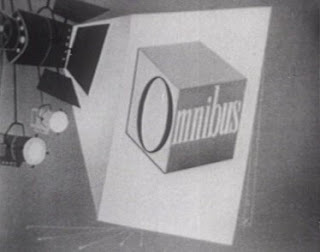 This revision, plus the toning down of some of the movie's comedic set pieces, adds a level of genuine poignancy to the story, not to mention providing us with a threat we can actually identify with. And when the story makes its way to television four years later, it is this version, not the one seen in theaters, that forms the basis for the teleplay, broadcast live on CBS's Sunday afternoon cultural variety show Omnibus and introduced by host Alistair Cooke, three days after Thanksgiving, 1953.
This revision, plus the toning down of some of the movie's comedic set pieces, adds a level of genuine poignancy to the story, not to mention providing us with a threat we can actually identify with. And when the story makes its way to television four years later, it is this version, not the one seen in theaters, that forms the basis for the teleplay, broadcast live on CBS's Sunday afternoon cultural variety show Omnibus and introduced by host Alistair Cooke, three days after Thanksgiving, 1953. That's not to say "The Horn Blows at Midnight" has become a straight drama; to the contrary, there are several funny moments, most of them centered around Benny's reputation for stinginess. For instance, while waiting in the lobby of the Waldorf for Danny to appear, a bellboy walks through the lobby "paging Jack Benny." The old woman sitting next to Athaneal comments that she always watches Benny's show (this is television after all, rather than radio) and adds that he must be "the sweetest, kindest, most generous man in the whole world." Athaneal also turns out to be a big tipper, giving the two shoeshine boys (one of them played by Harry Shearer!) a dollar each; "It's such a wonderful feeling to give money away," Benny says, with his trademark pause as he looks at the audience. And then there's the scene when a little girl at the Waldorf asks Athaneal how old he is; 357, he replies, but adds "I tell everybody up there that I'm 339," a play on Benny's perennially being 39.
These scenes ensure that "The Horn Blows at Midnight" maintains a lightheartedness that keeps it from ever becoming preachy, and makes maximum use of Benny's comedic talent. But the slapstick and the broad comedy of the movie have now been replaced with a humor that is at once both gentle and very human, underlining man's foibles while at the same time looking at him with a patient affection.
It also makes possible the story's most dramatic moment, the one that provides its moral center: Athaneal's plea for mercy on behalf of the people of Earth.
III
The eighteenth chapter of Genesis consists entirely of a conversation between God and Abraham, during which God expresses his anger toward the cities of Sodom and Gomorrah. "The outcry against Sodom and Gomorrah is so great and their sin so grievous that I will go down and see if what they have done is as bad as the outcry that has reached me," He tells Abraham. "If not, I will know."
 Abraham's response, demonstrating the closeness of his relationship with God, is revealing. “Will you sweep away the righteous with the wicked?" he asks. "What if there are fifty righteous people in the city? Will you really sweep it away and not spare the place for the sake of the fifty righteous people in it? Far be it from you to do such a thing—to kill the righteous with the wicked, treating the righteous and the wicked alike. Far be it from you!"
Abraham's response, demonstrating the closeness of his relationship with God, is revealing. “Will you sweep away the righteous with the wicked?" he asks. "What if there are fifty righteous people in the city? Will you really sweep it away and not spare the place for the sake of the fifty righteous people in it? Far be it from you to do such a thing—to kill the righteous with the wicked, treating the righteous and the wicked alike. Far be it from you!"In the face of this plea, God relents. "If I find fifty righteous people in the city of Sodom," He tells Abraham, "I will spare the whole place for their sake."
But Abraham doesn't stop there; "Now that I have been so bold as to speak wo the Lord, though I am nothing but dust and ashes, what if the number of the righteous is five less than fifty? Will you destroy the whole city for lack of five people?"
Again, God relents; if He finds forty-five, he will not destroy the city.
And so it goes, with Abraham continuing to bargain, reducing the number of the righteous first to forty, then thirty, then twenty; each time, God agrees to Abraham's pleas. Finally, Abraham dares to ask, "What if only ten can be found there?"
And God replies, "For the sake of ten, I will not destroy it."
The parallel between Abraham's imploration on behalf of Sodom and Gomorrah and Athaneal's appeal for the residents of Earth is obvious, and striking. Central to each is the plea on behalf of the innocent; just as Abraham asks if God intends to punish the righteous as well as the wicked, Athaneal looks at the suffering residents of Earth, many of whom bear no responsibility for the atrocities of the global war, and confronts the implicit moral dilemma as to whether they should pay this price without even having had a chance to build a world of their own.
He tells The Chief of the good, decent people he's met—not just Danny and Helen, but all the others: the shoeshine boys, the news dealer, the little old lady. "There are millions of others just like them, just hoping and praying for a better world," Athaneal pleads. "If you'd just give them a little more time. You've waited so long, thousands and thousands of years, suppose you wait just a little while longer, and then maybe everything can straighten itself out and be exactly the way you want it to be." At each invocation, a rumble of thunder greets Athaneal in reply, a sign of The Chief's determination to carry out the plan, but as the angel continues, the rumbles begin to diminish in intensity.
Finally, reflecting on his conversation with the taxi driver about the next war, Athanael plays his trump card. "If there's another war, the whole world would destroy itself and then there'd be no more Earth." He then appeals to The Chief's sense of justice, as well as his practicality: "Remember Chief, if that happened, then the responsibility wouldn't be yours. You wouldn't be to blame." Won over by Athaneal's argument, The Chief agrees to stay his hand—for now. Relieved that The Chief has granted his plea for mercy, Athaneal tells him, "I'd like to come home now."
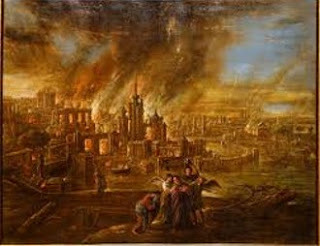 Before we get too comfortable with this bucolic scene, however, we should consider the warning implicit within, for it promises only the potential for a long-term happy ending. The implication is that the Earth is being given one final chance Give them one more chance, Athaneal pleads, allowing for the possibility that the Earth will even blow itself up and relieve The Chief from having to do it himself.—after all, in the very next chapter of Genesis, God's angels carry out the promised visit to Sodom and, after finding not even ten righteous men, warn Lot and his family to leave the town at once, after which the cities are laid waste, with "dense smoke rising from the land, like smoke from a furnace."
Before we get too comfortable with this bucolic scene, however, we should consider the warning implicit within, for it promises only the potential for a long-term happy ending. The implication is that the Earth is being given one final chance Give them one more chance, Athaneal pleads, allowing for the possibility that the Earth will even blow itself up and relieve The Chief from having to do it himself.—after all, in the very next chapter of Genesis, God's angels carry out the promised visit to Sodom and, after finding not even ten righteous men, warn Lot and his family to leave the town at once, after which the cities are laid waste, with "dense smoke rising from the land, like smoke from a furnace."IV
The television programs we've looked at in this series have portrayed a world that might well have been thought unthinkable to viewers when they watched them; we know from contemporary reviews that more than a few critics thought them improbable, unrealistic, heavy-handed. And in a dramatic sense that may well have been true. But what about in a prophetic sense? The writers of these stories were clearly providing us with warnings, For some, as in "Dialogues of the Carmelites" or "Murder in the Cathedral," it was using the past not merely as a historical detail but as a reminder that the unthinkable was once all-too possible. In other cases—"The Year of the Sex Olympics," "They," "A Sound of Different Drummers"—it was a logical extension of a future that had already been glimpsed, a preview of what could happen if events continued in that progression without being altered. In fact, in one way or another, to one degree or another, they all seem to have come to pass.
The signature themes we've seen throughout these stories are, for the most part, missing or in altered form in "The Horn Blows at Midnight." The New York in which Athaneal finds himself is not one of oppression or totalitarianism, and people are not being called upon to sacrifice their lives—consciously, that is. The only outward fear we encounter is a generalized sense, based on the experiences of the war and the Bomb, of man's inhumanity to man, but we don't see any dramatic examples of it. We didn't need to—everyone was already familiar with it. The world portrayed here is neither futuristic nor an echo of the distant past; for those watching it in real time, it was their world, a world they not only had experienced, but were experiencing even as they watched the show. That threat of nuclear war, voiced by the cab driver on Athaneal's frantic ride to the hotel, was something that was very real. And in that way it makes it a world more disturbing, more frightening, than any other that we've experienced.
We've seen, throughout this series, examples of sacrifice, of courage, of nobility and sacrificial love. But in "The Horn Blows at Midnight" we see something different, something overwhelming and essential: a deeply felt expression of compassion. Not sympathy, not pity, but compassion. Someone once described compassion as love put into action, and it's hard to find a better description for the feeling Athaneal comes to have for these humans and their planet.
Ever since receiving his assignment, Athaneal has been warned about the "nasty little globe" he's about to help obliterate. Upon his arrival on Earth, he sees the headlines of Investigations, wars, murders—even smog! But during this brief time, he also learns a great deal about its residents, observes them in various situations, listens to them as they shared their thoughts and fears, their hopes and dreams for the future. And he begins to have doubts, to even wonder if The Chief knows what he's doing.
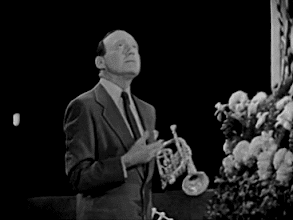 It is that compassion that emboldens him to speak so frankly with The Chief, to intercede with him on behalf of all those who will die without even having had a chance to build a world of their own. This ending—quite unlike that of the original movie—is what gives "The Horn Blows at Midnight" its gravitas, its moral weight. Having once seen it, it becomes more and more difficult to imagine the story without it, and perhaps that's one reason why the movie doesn't fare so well.
It is that compassion that emboldens him to speak so frankly with The Chief, to intercede with him on behalf of all those who will die without even having had a chance to build a world of their own. This ending—quite unlike that of the original movie—is what gives "The Horn Blows at Midnight" its gravitas, its moral weight. Having once seen it, it becomes more and more difficult to imagine the story without it, and perhaps that's one reason why the movie doesn't fare so well. It is also that compassion that seems to be in such short supply nowadays. We've become a world in which it's one strike and you're out, leaving no room for forgiveness, for understanding, for rehabilitation and reclamation—for humanity. The world seems to be caught in the grasp of a sickness today, one greater than that which existed in the time of "The Horn Blows at Midnight." Depending on the day, we have the potential to look at the news and read of some new moral depravity, something that might have been thought unthinkable a few years ago, but now has become accepted as the new normal. We see screaming mobs consumed by hatred—hatred for others, which ultimately traces its roots back to hatred for themselves. One need only to look at reactions to the Israel-Hamas war to see this, but in reality it has been growing steadily in the past few years, and if the growth now seems to be exponential, I'm sure there's a mathematical explanation for that.
In our headlong rush toward iconoclasm and nihilism—creating a world that only tangentially bears resemblance to the world that many of us have known, tearing down beliefs and codes that have sustained our existence for millennia, creating alternative realities that render reality itself to be nothing more than an objective observation, denying biology itself--we seem, quite literally, hell bent on self-destruction. And so, we should be hoping that The Chief shows as much patience with us as he did in 1953. Either that, or we have someone as eloquent as Jack Benny pleading our case for us. Meanwhile, night falls, and the clock continues to go tick, tick, tick . . . TV
Published on November 08, 2023 05:00
November 6, 2023
What's on TV? Monday, November 9, 1953

 To regular readers familiar with these 1950s Chicago editions, it must seem unusual to see a second Milwaukee station listed along with WTMJ. It's WCAN, a CBS affiliate, and we're fortunate to see it here, because it wasn't around very long. It commenced broadcasting on September 6, just two months ago, but ceased operations in February 1955 after less than two years. Why? For the answer, which naturally involves lawsuits, you can check out the
always-reliable Wikipedia
. For a look at what's on TV this fine day in Chicagoland, keep going!
2 WBBM (CBS) MORNING 8:00 RAY RAYNER—Comments 8:45 JOHN HARRINGTON—News 8:55 JIM CONWAY—News 9:00 GODFREY AND FRIENDS 10:30 STRIKE IT RICH—Quiz 11:00 VALIANT LADY—Serial 11:15 LOVE OF LIFE—Serial 11:30 SEARCH FOR TOMORROW 11:45 GUIDING LIGHT—Serial 12:00 LUNCHEON WITH BILLY 12:25 LEE PHILLIP SHOW—Tips 12:30 GARRY MOORE SHOW 1:00 DOUBLE OR NOTHING 1:30 LINKLETTER’S HOUSEPARTY 2:00 BIG PAYOFF—Quiz 2:30 BOB CROSBY SHOW 3:00 PETTICOAT PARTY—Games 3:30 SHOPPING WITH MISS LEE 3:45 U.N. GENERAL ASSEMBLY 4:00 “ANYTHING FOR A THRILL” MOVIE 5:00 GARFIELD GOOSE & FRIEND 5:30 GENE AUTRY TIME—Film 6:00 BOB ELSON—Sports 6:15 JULIAN BENTLEY—News 6:30 DOUG EDWARDS—News 6:45 PERRY COMO SHOW 7:00 BURNS & ALLEN—Comedy 7:30 TALENT SCOUTS 8:00 I LOVE LUCY—Comedy 8:30 RED BUTTONS—Comedy 9:00 STUDIO ONE—Drama “Camille” 10:00 FAHEY FLYNN—News 10:10 LEE PHILLIP—Weather 10:15 JOHN HARRINGTON—Sports 10:25 ART MERCIER—Sports Tips 10:30 JOHN HARRINGTON—News 10:45 IRV KUPCINET—Comments 11:00 WRESTLING—Film Ali Bey vs. Lucky Simonvitch. Vic Christy vs. Bob Corby. Vic Holbrook vs. Wee Willie Davis. Tony Martinex vs. Karl Davis. 12:00 “VILLAIN STILL PURSUED HER” MOVIE
To regular readers familiar with these 1950s Chicago editions, it must seem unusual to see a second Milwaukee station listed along with WTMJ. It's WCAN, a CBS affiliate, and we're fortunate to see it here, because it wasn't around very long. It commenced broadcasting on September 6, just two months ago, but ceased operations in February 1955 after less than two years. Why? For the answer, which naturally involves lawsuits, you can check out the
always-reliable Wikipedia
. For a look at what's on TV this fine day in Chicagoland, keep going!
2 WBBM (CBS) MORNING 8:00 RAY RAYNER—Comments 8:45 JOHN HARRINGTON—News 8:55 JIM CONWAY—News 9:00 GODFREY AND FRIENDS 10:30 STRIKE IT RICH—Quiz 11:00 VALIANT LADY—Serial 11:15 LOVE OF LIFE—Serial 11:30 SEARCH FOR TOMORROW 11:45 GUIDING LIGHT—Serial 12:00 LUNCHEON WITH BILLY 12:25 LEE PHILLIP SHOW—Tips 12:30 GARRY MOORE SHOW 1:00 DOUBLE OR NOTHING 1:30 LINKLETTER’S HOUSEPARTY 2:00 BIG PAYOFF—Quiz 2:30 BOB CROSBY SHOW 3:00 PETTICOAT PARTY—Games 3:30 SHOPPING WITH MISS LEE 3:45 U.N. GENERAL ASSEMBLY 4:00 “ANYTHING FOR A THRILL” MOVIE 5:00 GARFIELD GOOSE & FRIEND 5:30 GENE AUTRY TIME—Film 6:00 BOB ELSON—Sports 6:15 JULIAN BENTLEY—News 6:30 DOUG EDWARDS—News 6:45 PERRY COMO SHOW 7:00 BURNS & ALLEN—Comedy 7:30 TALENT SCOUTS 8:00 I LOVE LUCY—Comedy 8:30 RED BUTTONS—Comedy 9:00 STUDIO ONE—Drama “Camille” 10:00 FAHEY FLYNN—News 10:10 LEE PHILLIP—Weather 10:15 JOHN HARRINGTON—Sports 10:25 ART MERCIER—Sports Tips 10:30 JOHN HARRINGTON—News 10:45 IRV KUPCINET—Comments 11:00 WRESTLING—Film Ali Bey vs. Lucky Simonvitch. Vic Christy vs. Bob Corby. Vic Holbrook vs. Wee Willie Davis. Tony Martinex vs. Karl Davis. 12:00 “VILLAIN STILL PURSUED HER” MOVIE
4 WTMJ (MILWAUKEE) (NBC) MORNING 9:00 DING DONG SCHOOL 9:30 GLAMOUR GIRL—Contest 10:00 HAWKINS FALLS—Serial 10:15 GORDON THOMAS—Variety 11:00 WHAT’S NEW IN KITCHENS 11:45 LET’S LOOK AT THE NEWS 12:00 BOB HEISS—Interviews 12:55 BILL CARLSEN—Weather 1:00 BEHIND THE SCREENS 1:30 BEULAH DONOHUE—Tips 2:00 KATE SMITH SHOW 3:00 WELCOME TRAVELERS 3:30 ON YOUR ACCOUNT 4:00 SUPERMAN—Drama 4:30 HOWDY DOODY—Puppets 5:00 FOREMAN TOM—Western 5:30 LLOYD PETTIT—Sports 5:45 PAUL SKINNER—News 5:55 BILL CARLSEN—Weather 6:00 BLUE ROOM—Music 6:15 BEL TRIO—Music 6:30 ARTHUR MURRAY PARTY Guest: Vic Damone 6:45 JOHN CAMERON SWAYZE—News 7:00 NAME THAT TUNE—Quiz 7:30 VOICE OF FIRESTONE Guest: Patrice Munsel 8:00 BISHOP FULTON J. SHEEN 8:30 ROBERT MONTGOMERY 9:30 WHO SAID THAT?—Quiz Panelists: June Lockhart, Frank Conniff. Moderator: Walter Kiernan 10:00 INDUSTRY ON PARADE 10:15 PAUL SKINNER—News 10:25 BILL CARLSEN—Weather 10:30 BIG STORY—Drama 11:00 BIG TOWN—Drama 11:30 TOM MERCEIN SHOW 12:00 TOM MERCEIN—News 12:05 GEORGE JESSEL SHOW Guests: Teresa Brewer, Sid Stone, The Blackburn Twins, Evelyn Ward
5 WNBQ (NBC) MORNING 6:45 EVERETT MITCHELL—Talks 7:00 TODAY—Reports, Interviews 9:00 DING DONG SCHOOL 9:30 GLAMOUR GIRL—Contest 10:00 HAWKINS FALLS—Serial 10:15 THE BENNETTS—Serial 10:30 THREE STEPS TO HEAVEN 10:45 FOLLOW YOUR HEART—Serial 11:00 FRANCOIS POPE—Recipes 12:00 NOONTIME COMICS 12:30 ANIMAL PLAYTIME—Kids’ Fun 1:00 BOB & KAY SHOW—Variety 2:00 KATE SMITH SHOW 3:00 WELCOME TRAVELERS 3:30 ON YOUR ACCOUNT 4:00 ATOM SQUAD—Adventure 4:15 GABBY HAYES SHOW—Tales 4:30 HOWDY DOODY—Puppets 5:00 ELMER, THE ELEPHANT—Kids 5:30 KIDS’ KARNIVAL KWIZ—Film 5:50 JACK ANGELL—News 6:00 CLINT YOULE—Weather 6:05 ALEX DREIER—Features 6:10 JOE WILSON—Sports 6:15 DORSEY CONNORS—Travel 6:20 TONY WEITZEL—Comments 6:30 ARTHUR MURRAY PARTY Guest: Vic Damone 6:45 JOHN CAMERON SWAYZE—News 7:00 NAME THAT TUNE—Quiz 7:30 VOICE OF FIRESTONE Guest: Patrice Munsel 8:00 DENNIS DAY—Comedy 8:30 ROBERT MONTGOMERY 9:30 WHO SAID THAT?—Quiz Panelists: June Lockhart, Frank Conniff. Moderator: Walter Kiernan 10:00 CLINT YOULE—Weather 10:10 DORSEY CONNORS—Ideas 10:15 JACK ANGELL—News 10:30 NORMAN BARRY—Sports 10:45 HERBIE MINTZ—Musical 11:00 “BORN TO SPEED” MOVIE
7 WBKB (ABC) MORNING 9:00 PIED PIPER SHOW—Kids 9:30 CHILDCRAFT SCHOOL 10:00 BEULAH KARNEY PRESENTS 10:30 ED ALLEN—Exercises 10:50 WAYNE GRIFFIN—Weather 10:55 ULMER TURNER—News 11:00 BREAKFAST WITH O’NEIL 11:55 ULMER TURNER—News 12:00 HAPPY PIRATES—Kids’ Fun 12:30 TIME FOR FUN—Nick Francis 12:55 ULMER TURNER—News 1:00 RUTH CROWLEY—Baby Care 1:15 STUART BRENT—Discussion 1:30 THE DOWDS—Discussion 2:00 CLAUDE KIRCHNER SHOW 2:30 PAUL HARVEY—News 2:45 MIQUE COLLIS SHOW—Tips 3:00 TURN TO A FRIEND—Contest 3:30 ERN WESTMORE SHOW 4:00 ULMER TURNER—News 4:05 “BOSS OF RAWHIDE” MOVIE 5:00 ANGEL CASEY—Film 5:30 BOB ATCHER—Serial Film 6:00 AUSTIN KIPLINGER—News 6:05 JACK DREES—News 6:10 WAYNE GRIFFIN—Weather 6:15 JOHN DALY—News 6:30 JAMIE—Drama 6:45 SPENCER ALLEN—News 7:00 SKY KING THEATER—Western 7:30 “MINSTREL MAN” MOVIE 9:00 PAUL HARVEY—News 9:15 ULMER TURNER—News Sponsored by Foster TV 9:30 CARDS QUARTERBACK CLUB 10:00 PAGE ONE—News and Sports 10:30 DR. FIXUM—Household Ideas 11:00 ULMER TURNER—News 11:10 JACK EIGEN SHOW—Chats 12:00 “JIVE JUNCTION” MOVIE 1:30 ULMER TURNER—News
9 WGN (Du Mont) MORNING 9:00 PAUL FOGARTY—Exercises 9:30 TIME FOR STORIES 10:00 A TO Z OF COOKERY—Tips 11:00 STEVE FENTRESS—News 11:10 FIRST CURTAIN—Film “Carmen” 11:30 EARL NIGHTINGALE—Chats 12:00 HI LADIES—Interviews 12:45 MAGIC CARPET—Kids 1:00 WATCH TO WIN—Quiz 1:30 ADVENTURE IN LEARNING 2:00 PAUL DIXON SHOW—Musical 3:00 REVERIA SHOW—Commercial 3:15 MOVIE QUICK QUIZ—Game 3:30 JOHNS HOPKINS—Science 4:00 “ONE MAN’S LAW” MOVIE 5:00 JUNIOR EDITION—News 5:15 JUNIOR CROSSROADS 5:30 ROBERT F. HURLEIGH—News 5:45 CURBSTONE CUT UP—Chats 6:00 CAPTAIN VIDEO—Adventures 6:15 NUMBER PLEASE—Quiz Game 6:30 SPENCER ALLEN—Local News 7:00 TWENTY QUESTIONS—Quiz Panelists: Fred Van Deventer, Florence Rinard, Herb Polesie, Dick Harrison. Guest: Marge Green. Moderator: Jay Jackson 7:30 ALL-STAR WRESTLING 8:30 BEARS QUARTERBACK CLUB 9:00 BOXING—Eastern Parkway Edgardo Romero vs. James J. Parker 9:45 ARCH WARD—Sports 10:00 “TROUBLE PREFRRED” MOVIE (1st showing) 11:30 LEE NICHOLS—News 11:45 WEATHER NEWS
25 WCAN (MILWAUKEE) (CBS) MORNING 8:30 WINSTON BURDETT—News 9:00 GODFREY AND FRIENDS 10:30 STRIKE IT RICH—Quiz 11:00 RELIGIOUS FILM 11:15 LOVE OF LIFE—Serial 11:30 SEARCH FOR TOMORROW 11:45 GUIDING LIGHT—Serial 12:00 KIDS’ KARNIVAL—Fun 12:30 GARRY MOORE SHOW 1:00 DOUBLE OR NOTHING 1:30 NEWS AND TEST PATTERN 1:45 LINKLETTER’S HOUSE PARTY 2:00 BIG PAYOFF—Quiz 2:30 BOB CROSBY SHOW 3:00 TRUDY BEILFUSS—Foods 3:30 U.N. GENERAL ASSEMBLY 4:00 ARMCHAIR ADVENTURE 4:15 CHOOSE UP SIDES 4:30 Program Not Available 5:00 “SADDLE MOUNTAIN ROUNDUP” MOVIE 6:00 JOE KENNY—Weather 6:05 LAN SINGER—News 6:10 HAL WALKER—Sports 6:15 TV TOPICS—Preview 6:30 DOUG EDWARDS—News 6:45 PERRY COMO SHOW 7:00 BURNS & ALLEN—Comedy 7:30 TALENT SCOUTS 8:00 I LOVE LUCY—Comedy 8:30 RED BUTTONS—Comedy 9:00 STUDIO ONE—Drama “Camille” 10:00 HAL WALKER—Sports 10:05 DR. A. A. SUPPAN—News 10:30 DEATH VALLEY DAYS—Drama 11:00 “SHADOWS OVER SHANGHAI” MOVIE
TV
Published on November 06, 2023 05:00
November 4, 2023
This week in TV Guide: November 6, 1953
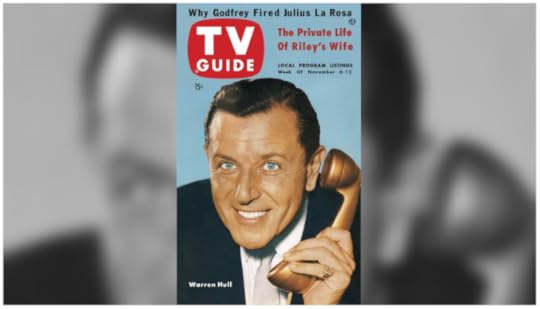
 For one of the first times in its short history, TV Guide has the chance to cover a real, live breaking news story, one of the biggest TV has yet seen: Arthur Godfrey's dismissal of Julius La Rosa on live television.
For one of the first times in its short history, TV Guide has the chance to cover a real, live breaking news story, one of the biggest TV has yet seen: Arthur Godfrey's dismissal of Julius La Rosa on live television.For the uninitiated, Julius La Rosa was a singer and a popular regular on Arthur Godfrey's show. On October 19, following a song by La Rosa, Godfrey announced—on the air—that "This was Julie’s swan song with us. Julius has asked for his release, and I will never stand in the way of anybody trying to improve himself. We wish him Godspeed." La Rosa, in fact, had no contract with Godfrey, and was given no warning that he was about to be sacked, let alone that it was going to happen on a live broadcast. Two days later, at a press conference, Godfrey confirmed that he had fired La Rosa. He said that La Rosa had "lost his humility," had refused to go to ballet class (required for all the regulars, so that they might appear more graceful on-air), and that morale among the cast was a problem.
How big a story is this? Well, the New York Teletype, ordinarily one page, is two pages this week, both devoted one hundred percent to the Godfrey-La Rosa story.* More than this, however, the report is the kickoff to a flood of stories, almost all negative, that TV Guide runs on Godfrey over the next few months.
*Lost in the hubbub was that Godfrey had also fired his longtime orchestra leader, Archie Bleyer, for having done some recording work with Don McNeill, star of ABC's Breakfast Club, on the air directly opposite Godfrey's morning show. The fact that Bleyer also owned the label for which La Rosa recorded was said to be a coincidence, not connected to Godfrey's move. Bleyer goes on to work with the Everly Brothers, Andy Williams, and others.
This isn't to say that TV Guide is singling out Godfrey for particular scorn; indeed, Godfrey had frequently featured in the magazine throughout the months since the national version had started. And the press which Godfrey received in the wake of the La Rosa firing was almost universally negative, if not outright hostile. Godfrey had never been particularly easy to work with, and there were plenty of negative stories out there about him, but given his popularity with the public, most of those stories were either spiked or ignored by a press that sought to cultivate favor with the Old Redhead. Now, however, the gloves are coming off, and, given all that hostile press, it could be said that TV Guide is merely reporting what's going on; if their coverage appears to be against Godfrey, it could simply be a reflection of the coverage at large.
This week's Letters section bears out how the public has been galvanized by the controversy. "A Disgusted Reader" in Streator, Illinois stands up for Godfrey; "It burns me up the way some people are always telling things they don't like about Arthur Godfrey. Why don’t they keep it to themselves or turn the dial? I wonder if they are not jealous. For as long as we can remember, Godfrey he has been a very big favorite of ours." On the other hand, "Teen-Agers" from Leland, Illinois provide the kind of negativity that Disgusted Reader is apparently talking about: "What is the matter with that dumb Arthur Godfrey? We teen-agers have always watched his shows but not any more if Julius La Rosa isn’t around. Why didn’t he fire Frank Parker—one of the worst singers there is? When Arthur was in the hospital, Robert Q. Lewis did a better job as a substitute." Robert Q. Lewis! Ouch!
 La Rosa and Godfrey in happier timesThe story continues to percolate over the years; Godfrey would later claim that one of the reasons he sacked La Rosa was that the young singer was engaged in an affair with one of the McGuire Sisters who happened to be married at the time; Godfrey not only disapproved of it personally, he also felt it would reflect poorly on his family show. Others felt Godfrey was jealous of the attention La Rosa got; it was said that his fan mail had begun to exceed Godfrey's. La Rosa rarely rose to the bait when the subject came up; he acknowledged that Godfrey "wasn't a very nice man" to him, but always gave him credit for having made his career. La Rosa would go on to make thirteen appearances on Ed Sullivan's show, sparking a feud between Godfrey and Sullivan.
La Rosa and Godfrey in happier timesThe story continues to percolate over the years; Godfrey would later claim that one of the reasons he sacked La Rosa was that the young singer was engaged in an affair with one of the McGuire Sisters who happened to be married at the time; Godfrey not only disapproved of it personally, he also felt it would reflect poorly on his family show. Others felt Godfrey was jealous of the attention La Rosa got; it was said that his fan mail had begun to exceed Godfrey's. La Rosa rarely rose to the bait when the subject came up; he acknowledged that Godfrey "wasn't a very nice man" to him, but always gave him credit for having made his career. La Rosa would go on to make thirteen appearances on Ed Sullivan's show, sparking a feud between Godfrey and Sullivan.As for Godfrey himself, he never recovers from the incident. The phrase "no humility" becomes a punchline for stand-up comedians, and Godfrey's relationship with the press deteriorates completely, with articles appearing linking Godfrey to affairs of his own with several female cast members. He fires more than twenty cast and crew members over the next couple of years, and in a bizarre incident his pilot's license is suspended for six months after he buzzes the control tower of Teterboro Airport in his DC-3. Most painful of all for Godfrey is the backlash from his formerly loyal fans. Having at one time hosted his morning show on both CBS TV and radio five days a week, with two additional prime-time programs on TV and another two on radio, by the late 1950s, he is reduced to his daily radio program, plus appearing on occasional TV specials. He is teamed up with Alan Funt as host of Candid Camera, but the coupling fares poorly and Godfrey is replaced after a single season.
He remains a giant in the history of radio and television, a fascinating and contradictory man with many interesting viewpoints. He also remains an abject lesson in how quickly the mighty can fall—and how far.
l l l
On the cover this week is Warren Hull, emcee of the quiz show Strike It Rich, one of the most popular—and most controversial—shows on the air. As it happens, I wrote a piece about this show many years ago, in the early years of this blog, as an example of how television exploits people in order to provide entertainment for the masses:
On this show, the halt, the blind and the needy catalogue their woes before 25,000,000 viewers and then, by answering routine quiz questions, tap the sponsor for money. And, if they’re lucky, some viewer's heart may be touched to the extent that he calls the show on the "Heart Line" and contributes more cash or gifts.
Henry McCarthy, New York's Commissioner of Welfare, has been a harsh critic of shows such as Strike It Rich. In particular, he's concerned about the children of families who benefit from appearing on the show; he fears they'll be harmed by "exposing their families to public gaze as objects of beggarly solicitation. It’s a miserable thing to do to children and may scar them for life." Other critics of the program—and there are many—say that the contestants could easily be given what they need without having to "debase" themselves in public, and that those involved with the show don't deserve the praise they receive, given that "they make a good living out of it."
Of course, not everyone agrees with this assessment, especially the emcee.
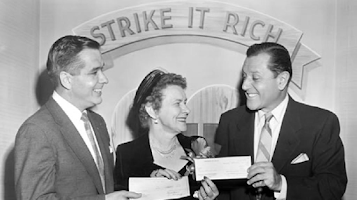 "We don’t force people to appear on our show or to say anything they don’t want to say," Hull says in answer to criticism that the "poor unfortunates" appearing on the show are forced to bare their souls to the public. "Let the people who have been criticizing us read some of the mail from people whose lives have been saved by us." Adds Walt Framer, producer and originator of the program, "We've been on the air over five years and in that time we’ve given a new start in life to over 1000 people." He also thinks that seeing stories of people in truly dire circumstances gives viewers a different perspective on their own problems—"First World problems," we'd call them today.
"We don’t force people to appear on our show or to say anything they don’t want to say," Hull says in answer to criticism that the "poor unfortunates" appearing on the show are forced to bare their souls to the public. "Let the people who have been criticizing us read some of the mail from people whose lives have been saved by us." Adds Walt Framer, producer and originator of the program, "We've been on the air over five years and in that time we’ve given a new start in life to over 1000 people." He also thinks that seeing stories of people in truly dire circumstances gives viewers a different perspective on their own problems—"First World problems," we'd call them today.Since Strike It Rich started, it's given away more than a million dollars in cash, which Framer says is a "drop in the bucket" compared to contributions received by viewers. As for the accusation that he's profiting from the misery of others, "I could make just as good a living producing dramatic or musical shows. Of course, I make a good living from this show, but I don’t make nearly as much as I could." But Commissioner McCarthy points out that the show presents “no opportunity to make painstaking plans that will really rehabilitate."
There are many different angles to a story like this: the old "give a man a fish vs. teach a man to fish" canard; the question of whether refusing charity is an indication of excessive pride; and the oldest one of all, whether or not the end justifies the means. The article ends with the note that, "The final arbiter will, of course, be the viewer." In that case, Strike It Rich is the winner; it began on radio in 1947, and its run on television lasted until 1958. But then, we still enjoy watching people bare it all for our entertainment today, so why should we be surprised?
l l l
Academy Award winner Loretta Young is one of several Hollywood stars making the jump to TV this season, and she's done so with an NBC anthology series which she both introduces and stars in: Letter to Loretta. The title alludes to the show's unique format, in which the stories are based "on the fan mail which Miss Young receives from people seeking her advice on their personal matters." I'm cynic enough to take that explanation with a grain of salt, and in fact midway through the first season the title is changed to The Loretta Young Show, which makes a lot more sense.
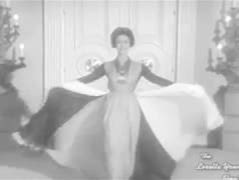 The show's trademark throughout its run, although it goes unmentioned in this week's review, is Young's entrance onto the set (said to be a recreation of her own living room), showing off her gown with a twirl as she comes through the front door of the room. It was, as the always-reliable Wikipedia points out, a gesture which was much parodied at the time, including by Ernie Kovacs; Young herself said that it allowed her a moment in each episode where she could be glamorous, after which she could play any character in the subsequent episode without fans wondering about her appearance.
The show's trademark throughout its run, although it goes unmentioned in this week's review, is Young's entrance onto the set (said to be a recreation of her own living room), showing off her gown with a twirl as she comes through the front door of the room. It was, as the always-reliable Wikipedia points out, a gesture which was much parodied at the time, including by Ernie Kovacs; Young herself said that it allowed her a moment in each episode where she could be glamorous, after which she could play any character in the subsequent episode without fans wondering about her appearance. But enough about all that. Our question is this: is the show any good? Well, the critic seems somewhat surprised to report, it is. Based on the "weepy-eyed characters" Young has played throughout her movie career, one might have expected this to be a "glorified soap opera," but instead, the weekly stories are "full of charm and good humor." Young herself is more poised and confident than virtually any movie star who's ever made a similar transition to TV, utterly believable whether playing a department store clerk, a young mother, or a sophisticated wife. Her supporting casts are equally good, and the productions are of a uniformly high quality. It may not be the greatest drama ever seen on television, the review concludes, but it should provide the viewer with "many a pleasant half hour," as indeed it will for eight seasons and 165 episodes.
l l l
Topper is another program getting the review treatment this week. Based on the 1937 movie starring Cary Grant and Constance Bennett as married ghosts and Roland Young as the man who purchased their old home, and whose life they haunt, this version made its debut this season, and already it's considered "one of the better new telefilm comedy programs of the season."
 Robert Sterling and Anne Jeffreys, real-life marrieds, are George and Marion Kerby, the fun-loving specters who died while skiing (along with their St. Bernard, Neil) while Leo G. Carroll plays Cosmo Topper, the "harried and henpecked bumbler" and subject of a reclamation project by the Kerbys, who decide they simply have to inject some fun into Topper's life. As is par for the course with these kind of characters (e.g. Mr. Ed, Mr. Snuffleupagus), only Cosmo can see the Kerbys and Neil, which is inconvenient for him but most convenient for us viewers.
Robert Sterling and Anne Jeffreys, real-life marrieds, are George and Marion Kerby, the fun-loving specters who died while skiing (along with their St. Bernard, Neil) while Leo G. Carroll plays Cosmo Topper, the "harried and henpecked bumbler" and subject of a reclamation project by the Kerbys, who decide they simply have to inject some fun into Topper's life. As is par for the course with these kind of characters (e.g. Mr. Ed, Mr. Snuffleupagus), only Cosmo can see the Kerbys and Neil, which is inconvenient for him but most convenient for us viewers. Topper is a fine adaptation not just of the movie, but of the bestselling novels by Thorne Smith that spurred the big screen comedy in the first place. The humor is sophisticated, sharp and witty—a family comedy, such as Father Knows Best, it is not—and contains fine doses of the satire which permeates Smith's novels. Sterling and Jeffreys are "probably the most charming pair of apparitions to have assumed bodily form on TV in years," and Carroll is the perfect foil for their shenanigans. The special effects, particularly the materialization and dematerialization of the Kerbys and scenes of objects floating through the air, are excellent. The only concern is whether or not the writers can keep things from wearing thin, and they're able to succeed for two seasons and 78 episodes.
l l l
Friday night's Topper episode (7:30 p.m., CBS) involves Marion developing a crush on Cosmo Topper's new personal trainer; it's the fifth episode of the series, and it seems as good a place as any to start our look at the week's highlights. Meanwhile, on Person to Person (9:30 p.m., CBS), Ed Murrow's guest is composer Richard Rodgers.
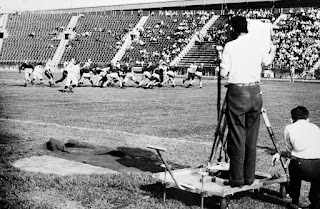 An increasingly popular feature in today's saturated world of sports is the "whiparound," in which the studio host (or hosts) switches viewers back and forth between a number of different games depending on where the most excitement is at the moment. It may seem like something made for today's short-attention span fans, but it really isn't all that new; NBC is doing that very thing in 1953 with college football; they call it "Panorama Coverage," for weeks when the network is airing multiple regional games rather than one national broadcast. This Saturday is the second Panorama week of the season, with the network covering Florida vs. Georgia, South Carolina vs. North Carolina, Northwestern vs. Wisconsin, and Kansas vs. Kansas State. (1:45 p.m.) It's duly noted that the time blocked out for college games back in 1953 is two hours and 40 minutes; today's games run at least an hour longer than that. I suppose as long as it makes for more commercials, it's progress.
An increasingly popular feature in today's saturated world of sports is the "whiparound," in which the studio host (or hosts) switches viewers back and forth between a number of different games depending on where the most excitement is at the moment. It may seem like something made for today's short-attention span fans, but it really isn't all that new; NBC is doing that very thing in 1953 with college football; they call it "Panorama Coverage," for weeks when the network is airing multiple regional games rather than one national broadcast. This Saturday is the second Panorama week of the season, with the network covering Florida vs. Georgia, South Carolina vs. North Carolina, Northwestern vs. Wisconsin, and Kansas vs. Kansas State. (1:45 p.m.) It's duly noted that the time blocked out for college games back in 1953 is two hours and 40 minutes; today's games run at least an hour longer than that. I suppose as long as it makes for more commercials, it's progress.The Ed Sullivan Show and the Colgate Comedy Hour go head-to-head this Sunday, with Ed's program coming from the Metropolitan Opera House in New York City. (7:00 p.m., CBS) Ed takes viewers backstage, as some of opera's greats are shown rehearsing for upcoming performances; Rise Stevens, Richard Tucker, Cesare Siepi, Hilda Gueden, Robert Merrill and Roberta Peters are among those appearing. Over on NBC, Jimmy Durante is the host of Comedy Hour, with Jimmy's old partner Eddie Jackson, Roy Bargy and his orchestra, and special guest Frank Sinatra. Even with Frank, I think I'd have to go with Sullivan on this one. And on our other reviewed show this week, Letter to Loretta, Loretta Young plays a young widow and mother being wooed by a New York magazine editor who doesn't understand her devotion to her six-year-old son. (9:00 p.m., NBC)
I think most of us know that professional wrestling was one of the TV hits of the 1950s, with many of wrestling's stars becoming larger-than-life household names. Perhaps it's because they're such cartoonish characters that the description for Monday's All-Star Wrestling (7:30 p.m., WGN) asks the question, "Are wrestlers human beings?" That might sound a little humanistic, but TV Guide promises to get to the bottom of it: "The first of our series on wrestlers, in next week's TV Guide, gives the lowdown on phony wrestlers." Phony wrestlers?? Next, they'll be telling us that Santa and the Easter Bunny aren't real. Horrors.
Tuesday we get a chance to see one of the more amusing head-to-head contests in early television: Milton Berle's Buick-Berle Show (7:00 p.m., NBC) vs. Bishop Fulton J. Sheen's Life is Worth Living (7:00 p.m. DuMont). It was a friendly competition, with the two having the highest respect for each other; Sheen used to joke about being called "Uncle Fultie," and Berle kidded that the Bishop outdid him in the ratings because he had better writers. Elsewhere, Robert Preston stars in a rare straight-dramatic performance in the U.S. Steel Hour episode "Hope For a Harvest," co-starring Faye Emerson. (8:30 p.m., ABC) It's the story of a depression-era farmer saved from despair by the love of a good woman.
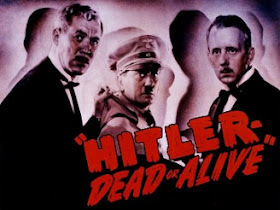 Wednesday's late-night movie on the NBC affiliate WNBQ (remember, this is in the pre-Tonight era) is Hitler—Dead or Alive, starring Ward Bond as one of three former Alcatraz prisoners hired to capture Adolf Hitler in return for a one-million-dollar reward. (11:00 p.m.) I was going to scoff at this, sight unseen, but then I got to thinking: TV shows from The Dirty Dozen to Garrison's Gorillas to Jericho have used this type of premise for years. And after all, is it really that much more implausible than the U.S. government recruiting Mafiosos to assassinate Fidel Castro—if anyone knows how to carry out a hit, it should be a team of gangsters. And Quentin Tarantino did admit that the inspiration for Inglorious Basterds came from this movie.
Wednesday's late-night movie on the NBC affiliate WNBQ (remember, this is in the pre-Tonight era) is Hitler—Dead or Alive, starring Ward Bond as one of three former Alcatraz prisoners hired to capture Adolf Hitler in return for a one-million-dollar reward. (11:00 p.m.) I was going to scoff at this, sight unseen, but then I got to thinking: TV shows from The Dirty Dozen to Garrison's Gorillas to Jericho have used this type of premise for years. And after all, is it really that much more implausible than the U.S. government recruiting Mafiosos to assassinate Fidel Castro—if anyone knows how to carry out a hit, it should be a team of gangsters. And Quentin Tarantino did admit that the inspiration for Inglorious Basterds came from this movie. One of the points made in the discussion about Loretta Young's move to television centered around the number of movie stars premiering on TV this season, and I was struck by the number of them just on Thursday. There is, of course, Groucho Marx on You Bet Your Life (7:00 p.m., NBC), but Groucho's been doing that gig since 1947. Better examples are Ray Milland, starring in the sitcom Meet Mr. McNutley (7:00 p.m., CBS), Charles Boyer, one of the Four Stars of the dramatic anthology Four Star Playhouse (7:30 p.m., CBS), and Ray Bolger, in the sitcom Where's Raymond? None of them were huge hits, but all three of them ran for at least two seasons, and Four Star made it to, appropriately enough, four, plus years in syndication under various titles.
l l l
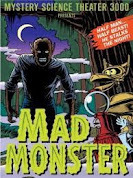 MST3K alert: The Mad Monster (1942) Mad scientist develops a method of transplanting the blood of a wolf into a man. Johnny Downs, George Zucco, Glenn Strange. (Thursday, 11:00 p.m., WCAN in Milwaukee) OK, this is a really bad movie; it makes it to MST3K on merit. We do have the consolation of another episode of Radar Men from the Moon, however. And don't feel too sorry for Glenn Strange as Petro, the monster: he'll go on to play Sam, the bartender of the Long Branch Saloon, in 222 episodes from 1961 to 1973. That calls for a drink! TV
MST3K alert: The Mad Monster (1942) Mad scientist develops a method of transplanting the blood of a wolf into a man. Johnny Downs, George Zucco, Glenn Strange. (Thursday, 11:00 p.m., WCAN in Milwaukee) OK, this is a really bad movie; it makes it to MST3K on merit. We do have the consolation of another episode of Radar Men from the Moon, however. And don't feel too sorry for Glenn Strange as Petro, the monster: he'll go on to play Sam, the bartender of the Long Branch Saloon, in 222 episodes from 1961 to 1973. That calls for a drink! TV
Published on November 04, 2023 05:00
November 3, 2023
Around the dial
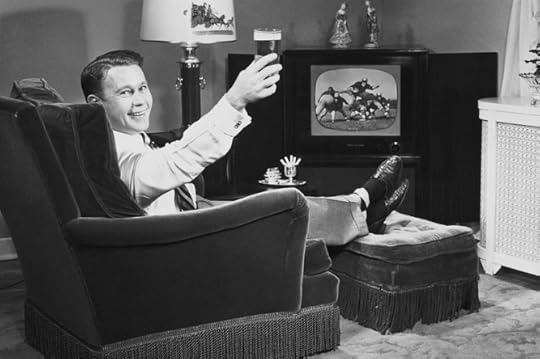
 Let's begin this week at Cult TV Blog, where John's series on the 1970s continues with
Murder Most English
, a 1977 series based on the detective stories by Colin Watson. Or are they detective stories? As John says, they're really understated social comedies, and what better format to explore them than through a detective?
Let's begin this week at Cult TV Blog, where John's series on the 1970s continues with
Murder Most English
, a 1977 series based on the detective stories by Colin Watson. Or are they detective stories? As John says, they're really understated social comedies, and what better format to explore them than through a detective?Sticking with British TV, at Cult TV Lounge, it's a rundown on Callan Uncovered , a collection of short stories by James Mitchell based on the acclaimed 1967-72 spy series starring Edward Woodward. The stories, dark and cynical (even more so than the series, if that's possible) ran in the Sunday Express for several years in the late 1960s and 1970s. If you're a fan of the series, this belongs on your shelf.
Halloween was three days ago, but for those of you still in the spirit (get it?), at A Shroud of Thoughts, Terence looks at a favorite episode from Old Time Radio: " Mr. Conklin's Halloween Breakdown ," from the much-loved series Our Miss Brooks, with Eve Arden, Gale Gordon, Jeff Chandler, and Richard Crenna. Sadly, it was never adapted for television.
Continuing in that vein, at Drunk TV, Paul travels back to the 1972 TV thriller Crawlspace , starring Arthur Kennedy, Teresa Wright, and Tom Happer, directed by John Newland, and with a score from Jerry Goldsmith; it's a cut above the average TV movie, and a nasty little piece of work. It deserves to be remembered more than it is, so have at it.
Let's keep going, with Captain Video's Secret Sanctum, and this comic adaptation of Arch Oboler's classic Old Time Radio series Lights Out. It's called " Come to the Bank ," and as a bonus you can listen to the audio version (first broadcast in 1942) while you read along. Who says radio doesn't come with pictures? And a warning: don't read it if you don't like to be scared.
Jack's Hitchcock Project at bare-bones e-zine continues with Lukas Heller's second episode for the show, the eighth-season " I'll Be Judge—I'll Be Jury ," starring Peter Graves, Albert Salmi, and Ed Nelson. It's a great example of adapting a novel into a television episode—not an easy task when you consider how difficult it is to even adapt a short story. It's not to be missed.
Last week at The View from the Junkyard, we looked at Mike's take on Star Trek: The Animated Series. I thought we'd stay with it again this week, with " The Magicks of Megas-Tu ," which may be a terrible name for an episode of anything, but this is a particularly good episode, one that might even have helped inspire one of the Star Trek big-screen adventures.
We've seen how one of the unique features of the 1970s was the number of big name stars who made the journey to the small screen in the form of less-than-successful TV series (Yul Brynner, Anthony Quinn, Diana Rigg, Jimmy Stewart, Shirley MacLaine, etc.), and here's one more example, courtesy of Travalanche: Fay , a short-lived sitcom starring Lee Grant. If you haven't heard of it, read on.
And finally, hats off to Gill at Realweegiemidget Reviews, celebrating her eighth anniversary in the blogging business. Let's hope there are many more years to come for one of my favorite blogs! TV
Published on November 03, 2023 05:00
It's About TV!
Insightful commentary on how classic TV shows mirrored and influenced American society, tracing the impact of iconic series on national identity, cultural change, and the challenges we face today.
- Mitchell Hadley's profile
- 5 followers



